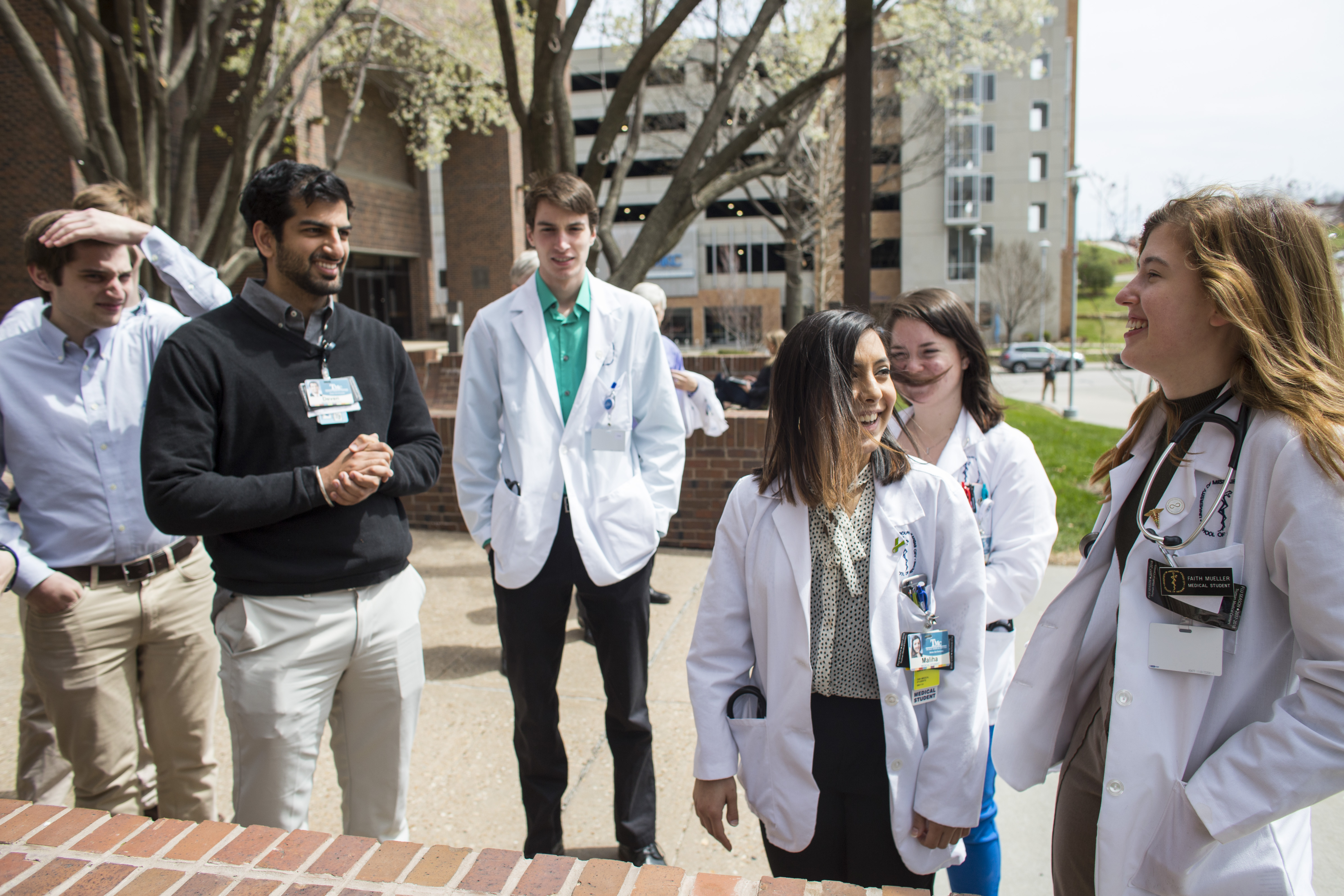
Leader will guide innovative six-year B.A./M.D. program, extensive research portfolio and further development of UMKC Health Sciences District
The University of Missouri-Kansas City has launched a national search for a new dean for the university’s acclaimed School of Medicine. The new dean will replace Mary Anne Jackson, M.D., who has announced her pending retirement from the deanship.
The new dean will lead one of the nation’s top urban-serving medical schools as it drives transformative change to improve and innovate medical education and health care in the region.
The UMKC School of Medicine has been an innovator in medical education since its opening in 1971, when it launched its unique and innovative six-year dual BA./M.D. degree program admitting students directly from high school. The school also offers a traditional four-year program for students who have completed an undergraduate degree.
The school has two campuses: one in Kansas City, Missouri, in the heart of the UMKC Health Sciences District; and one in St. Joseph, Missouri, where students receive a rich clinical education at a premier rural health system.
The next dean will be charged with shaping a broad strategy for the UMKC Health Sciences District. The district, formed in 2017, set its goal to become a premier academic health district, engaging in cutting-edge biomedical research and entrepreneurship, delivering state-of-the-science health care and educating the next generation of health-care professionals. Central to that strategy will be leveraging the potential of the forthcoming UMKC Healthcare Innovation and Delivery building, designed to serve as a catalyst for developing the Health Sciences District into a major regional academic medical center that can generate billions of dollars in jobs and economic impact for the Kansas City region.
Expanding the school’s research mission will be another important responsibility for the new dean. With more than 20 core faculty and 40 endowed professors and endowed chairs, the school’s research strengths include vision science, neuroscience, prenatal addiction, trauma/shock, maternal fetal medicine, cardiovascular and metabolic diseases, surgical safety and implementation science. The school has received more than $23 million in NIH-sponsored research in the most recent year.
Co-chairs of the search committee are Charlie Shields, President and CEO of University Health, one of the school’s clinical partners; and Kevin Truman, dean of the UMKC School of Science and Engineering. The full committee includes representatives from other clinical partners, faculty from the School of Medicine and other health professions schools in the UMKC Health Sciences District, School of Medicine alumni and UMKC medical students.
The national health-care leadership firm Isaacson, Miller is conducting the search. For more information, contact managing associate Nicholas Strand, 617-933-1913, nstrand@imsearch.com; or search coordinator Lileana “Lily” Sethares, 617-933-1889, lsethares@imsearch.com.
Mar 30, 2023
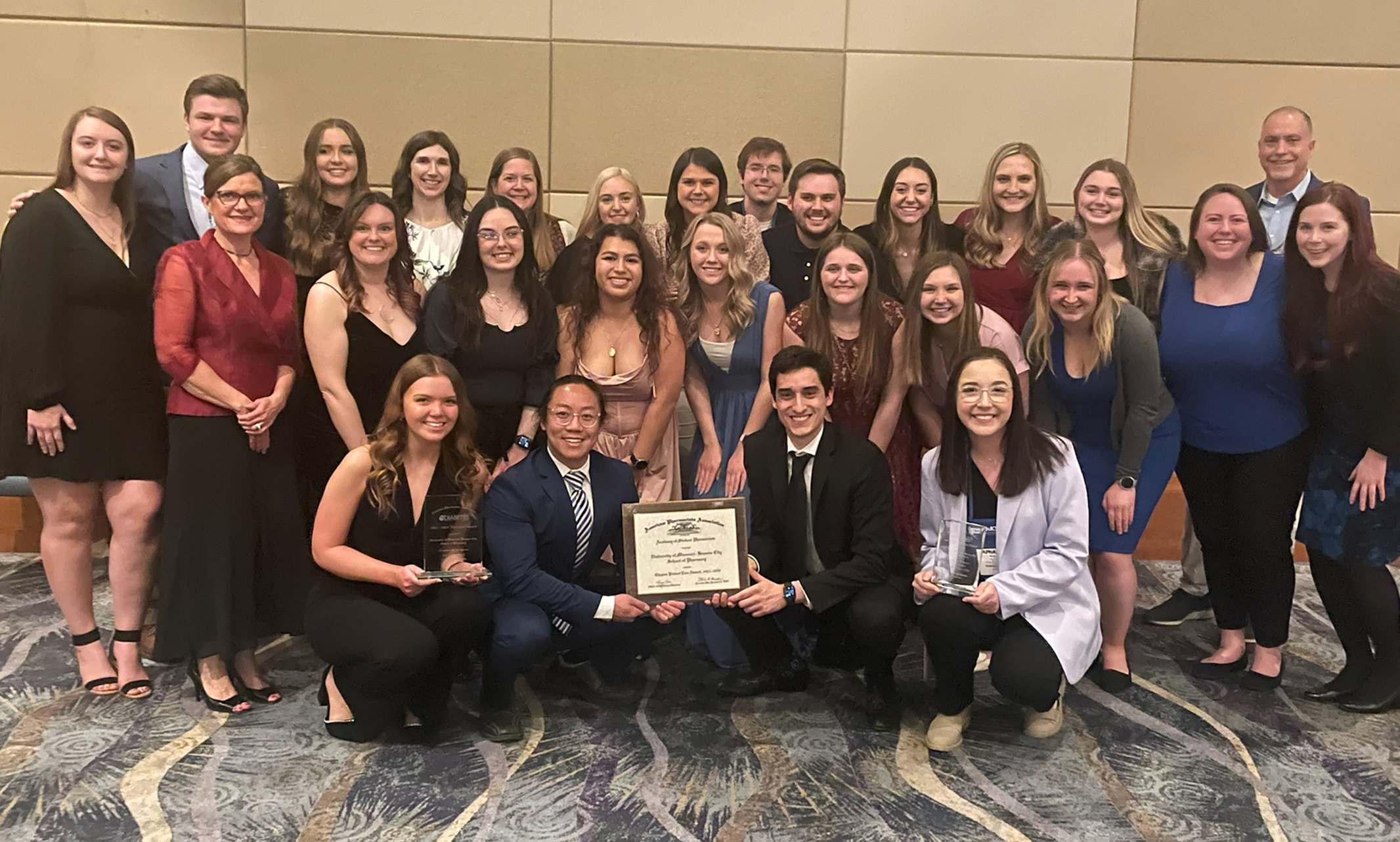
Student chapter of American Pharmacists Association recognized for its excellence in community engagement initiatives
The UMKC School of Pharmacy continues to draw national recognition for its excellence in developing programs that engage, educate and improve the health of the community it serves.
The American Pharmacists Association Academy of Student Pharmacists (APhA-ASP) selected its UMKC chapter from nearly 130 chapters across the country to receive the top national awards for the school’s local community engagement initiatives as well as a number of individual awards and recognitions, at a national meeting and exposition March 24-27 in Phoenix.
The school received the organization’s Patient Care Award for most outstanding local initiatives, the Over The Counter Medicine Safety Award that focuses on safe medication practices and the Operation Diabetes Award for efforts to raise awareness and reduce complications associated with type 2 diabetes.
“Many chapters only focus on the national initiatives, but not our crew,” said faculty advisor Cameron Lindsey, Pharm.D.
The awards acknowledge the combined efforts of students at the UMKC School of Pharmacy’s three campuses in Kansas City, Columbia and Springfield. They recognize pharmacy programs that excel in creating opportunities for student participation while raising the standards of leadership, professionalism, membership, patient care and legislative advocacy among student pharmacists nationwide.
Chapters are evaluated based on originality of their programs, the number of chapter members involved, impact on the community, benefits to student pharmacists and collaboration with other healthcare organizations.
UMKC received the Patient Care Award for student efforts in developing a ROOt 4 Health program that raises school-aged children’s awareness about healthy food and activity choices. The chapter also started Operation Self-Care, which strives to reduce the stigma around mental health and encourages good practices for wellness.
This was the second consecutive year that UMKC has received the No. 1 national award for Over The Counter Medicine Safety, based on students’ efforts to educate elementary, middle, and high school students about safe medication dosing and risks associated with over-the-counter medications. UMKC students also educate adults about safe dosing for children in their care.
As part of Operation Diabetes, students at all three of the schools’ campuses screened patients in rural, suburban and urban venues, and referred those found at high risk for further care.
“Our students never cease to amaze me with their innovative ways to reach patients where they are,” Lindsey said. “They continually provide health education, screening and vaccinations to audiences across our state from many backgrounds. This is on top of their busy academic and work schedules. They are an example to all of us to leave the world better than they found it. I am excited to see that their hard work is being recognized on the national stage.”
Lindsey also was honored with the Linwood F. Tice Friend of APhA-ASP Award, which recognizes an individual whose long-term services and contributions have benefited the APhA–ASP and student pharmacists in general.
Russ Melchert, dean of the School of Pharmacy and current president of the American Association of Colleges of Pharmacy, commended the school’s APhA-ASP chapter faculty advisors: Lindsey, Jordan Rowe, Kathryn Holt, Angela Brownfield, Sarah Cox, Brandi Bowers and Lisa Cillessen.
“Students clearly followed the excellent examples set by their mentors serving as advisors and all of our faculty and staff who assisted them in getting where they are,” he said.
APhA-ASP Individual honors and recognitions:
Allison Eppenauer, third-year student on the Kansas City campus, received the national APhA Student Leadership Award and an APhA Foundation Scholarship.
Hadia Malik, fourth-year student on the Kansas City campus, served on the APhA-ASP National Executive Committee as a member-at-large.
Karissa May, third-year student on the Kansas City campus, competed in the National Patient Counseling Competition.
Daphne Boggs, second-year student on the Springfield campus, served as chapter delegate to the APhA-ASP House of Delegates.
Alex Steury and Makaela David, second-year students on the Springfield campus, and Allison Eppenauer, third-year student on the Kansas City Campus, gave a platform presentation highlighting the chapter’s “Policy and Advocacy Literacy Certificate” that was a regional finalist in the Innovating Programming Award.
Megan Maetten, second-year student on the Columbia campus, presented a poster on “Evaluating student and graduate pharmacist perception of knowledge and confidence level when addressing topics related to the opioid epidemic at the UMKC School of Pharmacy.”
Faculty member Yifei Liu served as the APhA-APRS delegate to the APhA House of Delegates
Jordan Rowe presented a PharmTalk about “Lessons Learned Initiating an Interprofessional LGBTQ+ Clinic Providing Gender Affirming Care with a Safety-Net Health System.”
UMKC APhA-ASP Awards
2022 APhA-ASP Division A 2nd Runner-Up, National Chapter Achievement Award (Top 10 in the US)
2021 APhA-ASP Division A National Chapter Achievement Award (Top 4 in the US)
2020 APhA-ASP Chapter of the Year (No. 1 in the U.S.)
2019 APhA-ASP 1st Runner Up in Chapter Achievement (Top 7 in the U.S.)
2018 APhA-ASP Chapter of the Year (No. 1 in the U.S.)
2017 APhA-ASP 1st Runner Up in Chapter Achievement (Top 7 in the U.S.)
2016 APhA-ASP Chapter Achievement Award (Top 4 in the U.S.)
2015 APhA-ASP Chapter Achievement Award (Top 4 in the U.S.)
2014 APhA-ASP 1st Runner Up in Chapter Achievement (Top 7 in the U.S.)
2013 APhA-ASP Chapter Achievement Award (Top 4 in the U.S.)
2012 APhA-ASP Chapter of the Year (No. 1 in the U.S.)
Mar 30, 2023
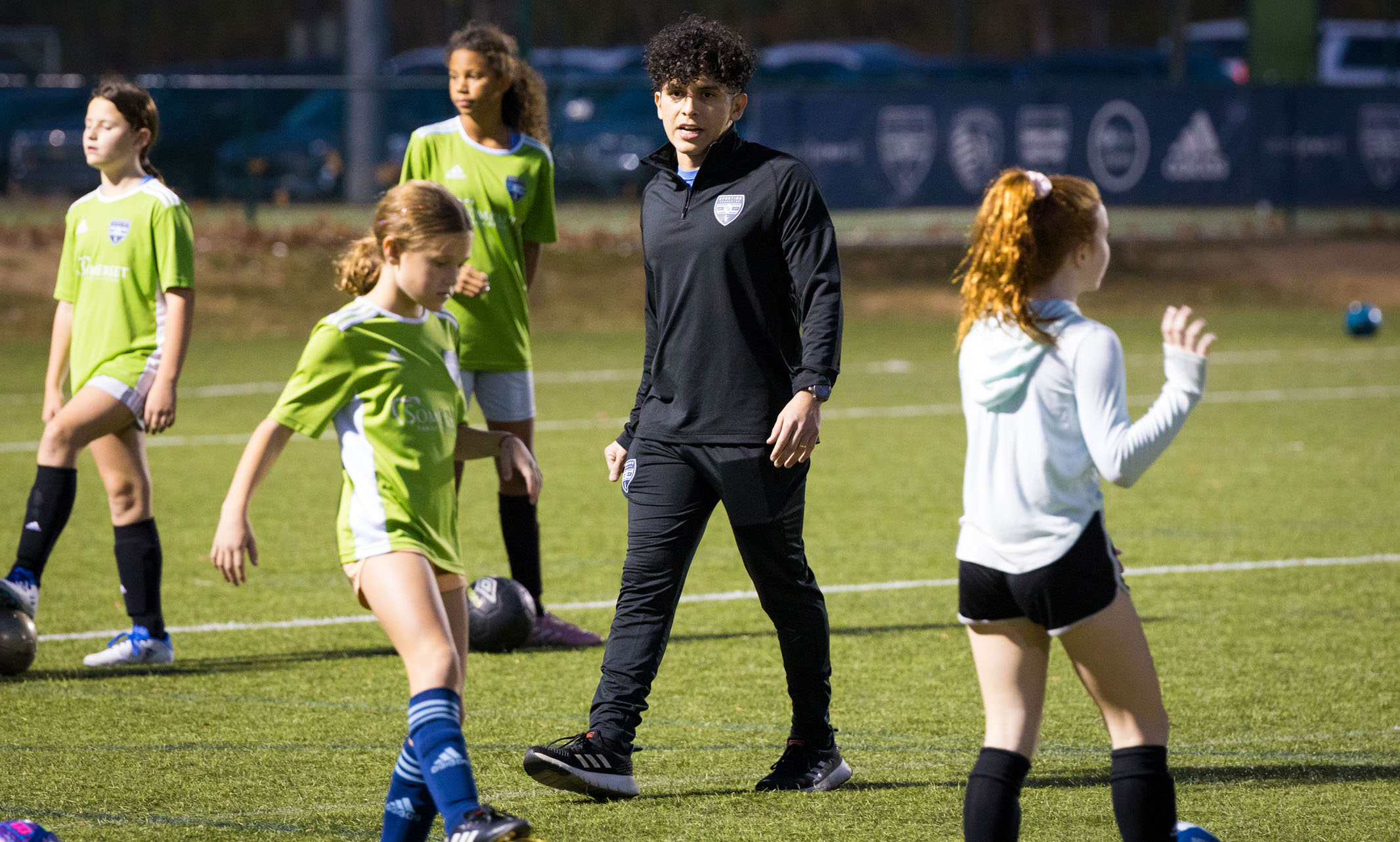
Dental student and soccer talent Edgardo Leiva needed coaches for his youth soccer business and his fellow students were the talent pool he needed.
Roos don't just dream, they do. Our students turn ideas into action every day. Get to know our people, and you'll know what UMKC is all about.
Edgardo LeivaAnticipated graduation: 2023Academic program: Doctor of Dental Surgery, UMKC School of DentistryHometown: San Pedro Sula, Honduras
Dental student Edgardo Leiva rose through the competitive ranks of soccer, from the Honduran National Team to college soccer in United States. His playing career came to an end as his career as a dental student ramped up. He soon transitioned to coaching in addition to his dentistry studies. His sought-after coaching skills were in such high demand that he formed his company, Soccer Roots, where he began hiring additional coaches, including many of his fellow dental students.
How did your soccer career begin?
I started playing competitively when I was 12 or 13, eventually participating in the developmental program for the Honduran national team. But the situation in Honduras became too difficult for my family, so my mom brought us to Miami, where my grandmother was living. When we first moved there, it was very difficult. My mom had to work multiple jobs.
What was your path to UMKC?
I played soccer at a couple of colleges in the Midwest, eventually landing at UMKC to play for the school’s soccer team. As my collegiate playing career was ending, I knew I needed to figure out something else to do. I always wanted to go into dentistry, but to do that I needed to put my focus on my academics.
What opportunities have come to you while at UMKC?
My academics really started taking off when I began working in the research lab of Ryan Mohan, a professor in the UMKC School of Science and Engineering. I met Ryan at a soccer camp where I was coaching his kids. Getting more involved in research really helped me focus on my academics but I always kept up coaching.
How did your coaching career develop?
I was coaching recreational teams for Sporting Brookside, a Kansas City soccer league. The league includes both recreational teams that are open to all and a competitive side where players try out to participate. The parents liked the structure of my recreational practices and were interested in me providing additional coaching to their kids who wanted to transition to the competitive side. That’s when I started my company, Soccer Roots, which now oversees the Elite Program within Sporting Brookside for players interested in additional training to help them continue to the higher levels of the sport.
How have your fellow dentistry students helped with that?
The workload grew to where I had seven teams. On the weekends I would coach 15 games, but it was getting out of hand. I started with hiring our class president and a close friend of mine, Morgan Engelbrecht, to help with the admin side of things. Also, I always need coaches, and I was meeting dentistry students who had soccer experience, even a few who played at the collegiate level. I thought, what better people to coach these kids than my friends in the dental school? I’ve had as many as 14 coaches on my payroll, with eight being dentistry classmates.
How has soccer shaped you as a person?
I’m so grateful to soccer because I would not be where I am now. It provided me a pathway to becoming a dentist by molding my character. It taught me discipline, responsibility and how to work hard. I owe soccer a lot, and I’ll always be involved in the sport.
How did the structure of coaching help you in your academic pursuits at UMKC?
When you’ve been in soccer for so long, teaching someone to kick a ball is not something that comes naturally. You have to think back on how to dissect the process to be able to teach it. It’s the same in academia, where you learn the process and are able to dissect everything you learn.
What can you take from soccer that will help you as a dentist?
Playing soccer -- and especially coaching -- has helped me in dealing with my patients. Dentistry is basically coaching. We coach our patients to keep good oral hygiene and teach them the skills to achieve that.
Do you have any plans to incorporate soccer into your dentistry career?
One of my goals before I graduate is to create a nonprofit soccer camp that incorporates oral health. I’m coordinating with the pediatrics department at the UMKC School of Dentistry, where we would offer free soccer camps. One of the rotations is going to be an oral health screening. Ultimately, I would like something that connects my two passions while making an impact on the next generation.
Why is it important for students to cultivate interests outside of the occupation they’re working towards?
It’s important to have balance. I learned from one of my mentors that you can’t just look at teeth all day. You’ll be so much more fulfilled when you’re engaged in things you’re passionate about.
Mar 28, 2023
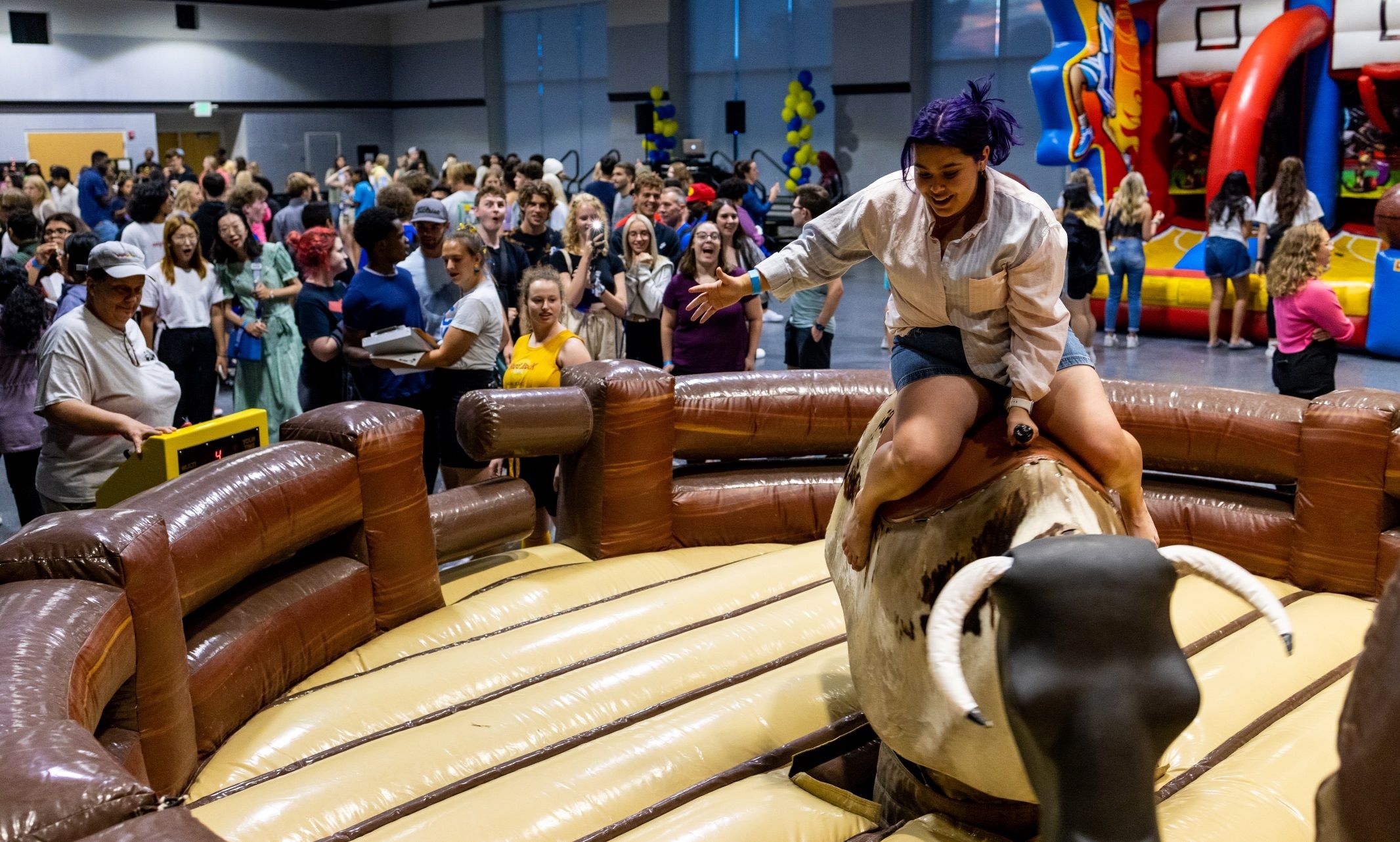
She’s part of UMKC Professional Career Escalators in the business track
Roos don't just dream, they do. Our students turn ideas into action every day. Get to know our people, and you'll know what UMKC is all about.
Ariela LaraAnticipated graduation year: 2026UMKC degree program: engineering and business track, Professional Career EscalatorsHometown: Ozark, Missouri
Ariela Lara, a first-generation college student emerging from the foster-care system, arrived on campus with no idea what to expect, or what was expected of her.
That changed quickly though, thanks to her participation in the Professional Career Escalators program at the University of Missouri-Kansas City. It’s a comprehensive career-development program designed to propel students from their academic studies to high-paying careers by providing a dedicated, GPS-guided path from enrollment to career success.
“Here at UMKC, they really care about you being able to succeed,” Lara said. “There are so many resources to help you. I really benefit from having a mentor to help me not only navigate college, but help me understand how I can be successful in my career. And the program really helps you make connections.”
The Professional Career Escalators program provides students with a unique, trademarked system of personalized support and services, preparing students for careers in four key areas of workforce demand: law and justice, engineering and business, education and health care.
Each semester, students participate in the five Professional Career Escalators core experiences: career guidance and development; experiential learning opportunities (such as job shadowing and internships); mentoring with faculty experts and community professionals; graduate and professional school preparation; and leadership development.
The program is helping Lara narrow her focus.
“Business is such a broad field, and it can be hard to narrow down to what you really want to do,” she said. “I wanted to go into a program that would let me be creative, but I didn’t want to go into the arts. In high school I took a business class, and I joined DECA (formerly Distributive Education Clubs of America). I realized that I was good at it, and I loved it. And as I started to learn more about business, I fell in love with marketing.”
How has your college program inspired you?
Seeing so many people working so hard to be successful really motivates and inspires me to want to be that way and do that.
Since entering college, what have you learned about yourself?
That I am more ambitious than I thought. All I can think about is how much I want to succeed, and that I will do anything I have to.
What are your feelings about being a first-generation college student?
It is something I am immensely proud of. I am the first in my family to explore this realm. They never had this opportunity.
Do you have any scholarships?
Coming from the foster-care system, I am paying for all my college costs. I have been fortunate to be able to receive many scholarships for this year and they mean a lot to me. I worked really hard in high school to be able to receive scholarships.
What other extracurricular activities are you involved in at UMKC?
I am in First Gen Roo, Bloch Ambassadors, Bloch Launchpad and Enactus.
Mar 28, 2023
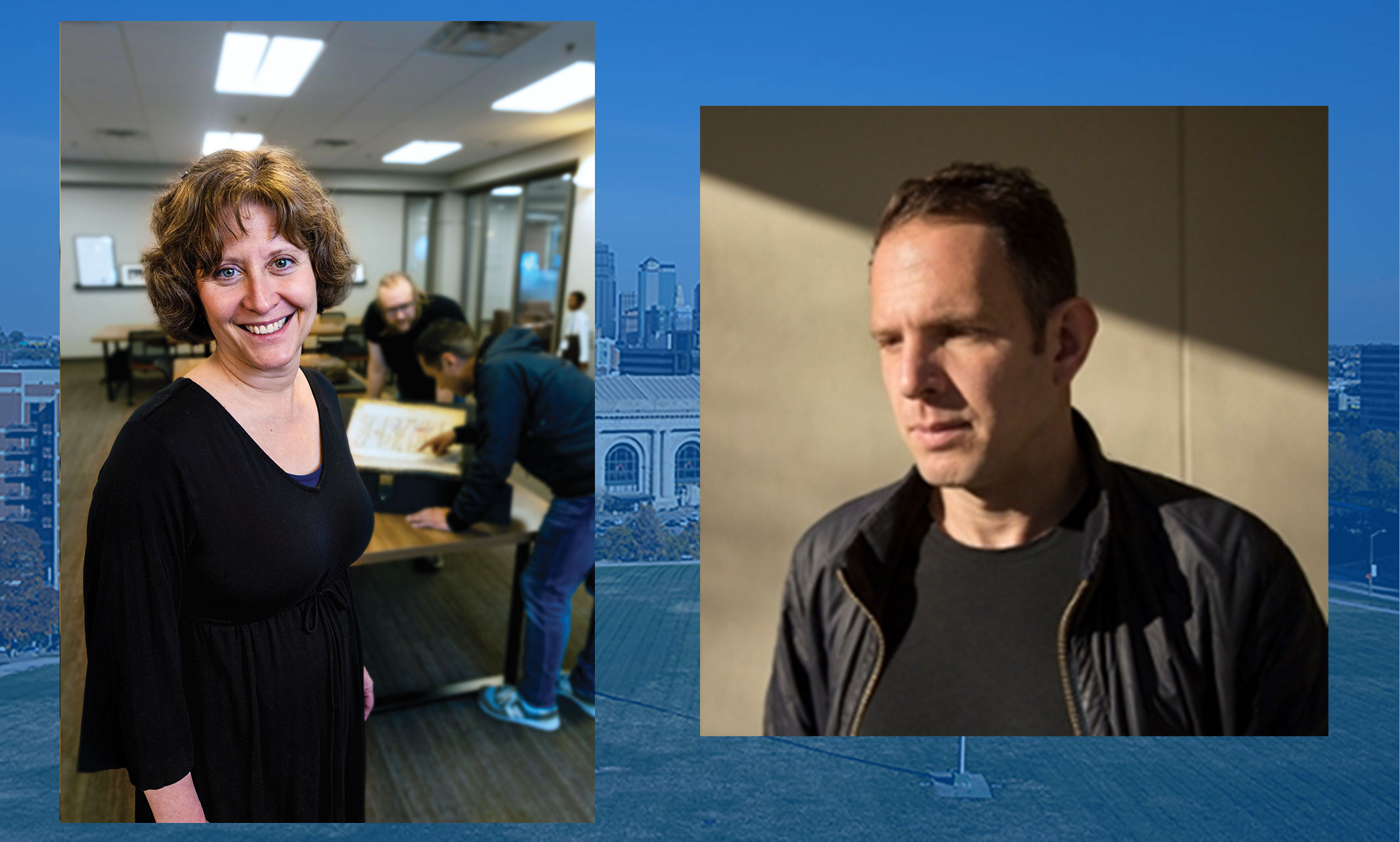
Blanton and Haber to spend research year abroad
Two UMKC faculty members have been selected to work abroad as Fulbright Scholars for the 2023-24 academic year.
Virginia Blanton, Ph.D., Curators' Distinguished Professor, will go to the Ruusbroec Institute in Antwerp, Belgium, to research English nuns who sought refuge in Catholic Flanders during the Reformation.
Yotam Haber, D.M.A., associate professor of music composition in the UMKC Conservatory, will go to the Jerusalem Academy of Music and Dance in Israel to further develop the cross-fertilization of his creative work with traditional Jewish liturgical cantillation practices.
The Fulbright Program, the flagship international academic exchange program sponsored by the U.S. government, has fostered mutual understanding between the United States and other countries since 1946. The Fulbright U.S. Scholar Program sends American scholars, artists, faculty and professionals abroad to lecture and/or conduct research for up to a year.
Blanton has had a long-term research focus on medieval women and their relationship with books. In Antwerp, she will focus on the Birgittines of Syon, a wealthy and influential community near London, who refused Henry VIII’s directive to close their community and went to Flanders.
“They cultivated and circulated devotional reading material, and yet no one has investigated Belgian repositories for their lost books or for evidence of their time in Antwerp and the surrounding region,” Blanton said. “I will be working in various archives and libraries across Flanders to identify books and other materials, as well as organizing a series of workshops that will bring together researchers who focus on Birgittines in Sweden, England, Belgium, Italy, Spain and beyond.”
“One of my career goals was to secure a Fulbright to a multilingual country, and Belgium – where there are speakers of Dutch, French, German as well as multiple other immigrant languages – is ideal,” she said. “I was a French major in college and my daughter attends a French-immersion school, so it was important that I seek out an opportunity where we could be immersed in a culture that is not primarily Anglophone.
“I am incredibly grateful for this opportunity, and I look forward to representing UMKC in my time abroad.”
Haber was born in the Netherlands but grew up in Israel until the age of 5, when his family relocated to Africa.
“Most of my family is in Israel, and I have visited many times for short periods since my childhood, but have never stayed for an extended period,” Haber said. “For the last decade or so, I have been focused on writing music that intermingles Italian Jewish liturgical practices with my own contemporary musical voice. This fascination with Italian Jewish traditions, rather than ‘straight from the source,’ is born from my own nomadic existence. The Fulbright allows me to finally spend time in Israel, learning about how those liturgical cantillation practices originated. In addition, I am excited to immerse myself in the new music community of Israel.”
“I am honored to receive this award,” he said. “I’m very curious to engage with composition students in Israel and learn about the cultural, political, religious and other factors that drive and inspire them.”
Mar 23, 2023
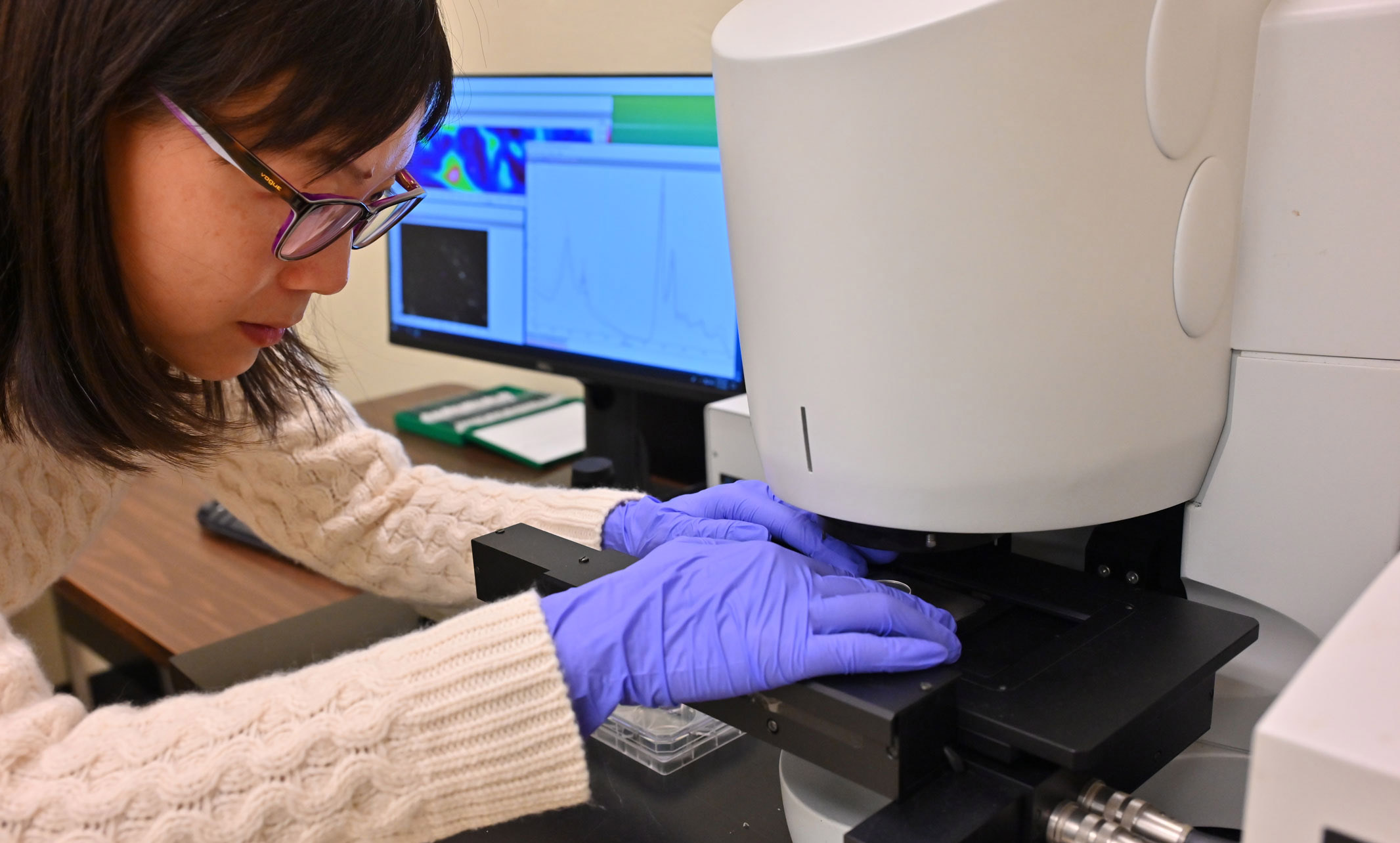
Rose Wang’s research received grant funding from the National Institutes of Health
The traditional tissue biopsy method of cancer diagnosis has been around for more than 50 years. The method finds the presence of cancer, but frequently too late to treat it successfully.
As a researcher at the University of Missouri-Kansas City School of Dentistry, Rose Wang, Ph.D., focuses on establishing a system to identify the risk of cancer through artificial intelligence and infrared technology. She is confident that this method, designed to intercept precancerous lesions before they become a deadly form the disease, can be applicable to other forms of cancer as well.
The scientific community has taken note of the promise behind Wang’s research. She received a $430,000 developmental research grant in January for her innovative research from the National Institutes of Health (NIH).
“We’re not trying to diagnose cancer itself,” Wang said “We are creating a system to detect high-risk precancers and to prevent them from becoming cancer. If we’re able to detect it early on, there’s more we can do about it, and the treatment is more effective. I’m very excited about that.”
Wang is studying the application of artificial intelligence, such as machine learning, to analyze the biochemical data from tissue samples using infrared spectroscopic imaging, a device that provides higher dimensional data than traditional imaging methods, such as a microscope. She uses both specialized software and open-source computer programs to train machine learning models to extract the most important information from what the spectroscopy shows. The level of detail is immense, with each pixel providing thousands of variables across different wavelengths.
“Manually reviewing the data is almost impossible,” Wang said. “that’s why we need to use machine learning to extract the important information and to train models for automatic risk stratification.”
Wang has pulled together an impressive research team from not only the UMKC School of Dentistry, but also the UMKC School of Science and Engineering as well as the University of Kansas Medical Center. Her multidisciplinary team covers a wide range of expertise: infrared spectroscopy and imaging, clinical pathology, artificial intelligence, oral biology and cancer biophysics.
The current gold standard for cancer detection is the histopathological diagnostic approach, cutting tissue sample for a biopsy. The sample is then sent to a pathologist to be visually evaluated for the presence of cancer. "Pathologists spend years to train their eyes to see those morphological anomalies and say cancer or no cancer,” Wang said.
The pathologist looks for what is called morphological changes of cells and tissues. Unfortunately, these changes don’t show up until the cancer is already progressing. According to Wang, the problem is that 70% of all oral cancers are diagnosed at late stages, leading to a low 50% survival rate at the five-year mark.
Precancerous lesions are not cancer but have increased risk of becoming cancer. According to Wang, pathologists don't yet know how to differentiate which precancerous lesions, known as dysplasia, will transform into cancer. Sometimes the cells just stay in the precancerous state without becoming cancer. If the pathologist finds mild or moderate abnormalities, frequently clinicians will opt to observe the problem area over time.
"But what if the patient did come back in a year and suddenly they have cancer from even mild dysplasia?" Wang said. "Right now, there is no reliable way to determine which precancerous lesions will become cancerous."
The other issue is the subjectivity of the traditional process. Wang said two well-trained pathologists can provide different diagnoses for the same tissue biopsy.
“The system we are developing will provide objective and quantitative diagnostic information and facilitate clinicians to make better management plans for their patients,” Wang said. “Oral cancer survival is highly stage-dependent, and early detection can significantly improve patient survival rate. If we can catch them early, we can save lives.”
Mar 23, 2023
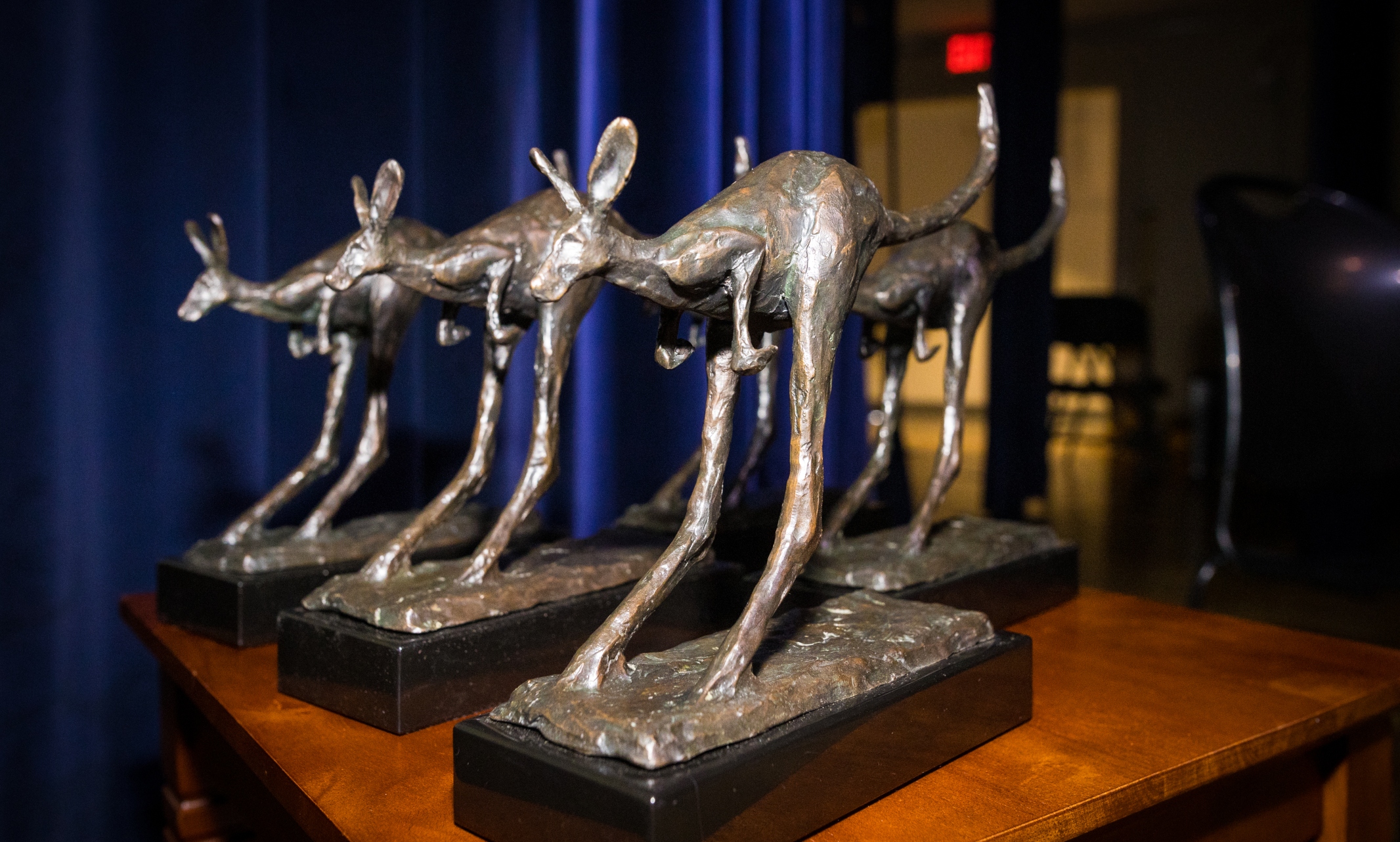
15 alumni and one family honored
The University of Missouri-Kansas City Class of 2023 Alumni Achievement Awards ceremony celebrated and recognized the accomplishments of UMKC alumni.
In addition, the ceremony generates funds to supports student scholarships. In the last decade, the Alumni Awards event has garnered more than $1 million in scholarships and immediate student aid for UMKC.
“I am always excited for the Alumni Awards because they recognize hard work, dedication and resilience,” Chancellor Mauli Agrawal said. “No one achieves this level of success without tenacity – and excellent preparation. It’s an honor to recognize our alumni’s achievements, and it’s always a joy to be with you for this event.”
Alumnus Sean O’Brien, (J.D. ’80) was recognized as the Alumnus of the Year. He received the highest honor bestowed by the UMKC Alumni Association for his career of freeing the wrongly convicted. After directing the Missouri Capital Punishment Resource Center for 15 years, he returned to UMKC as a visiting professor and later became a full professor. He credits his education at the UMKC School of Law for providing the foundation for his success.
“UMKC School of Law prides itself on producing practice-ready lawyers, and that was true in my case.”
Complete list of awardees:
Alumnus of the year: Sean O’Brien (J.D. ‘ 80)
Bill French Alumni Service: Patricia Macdonald (B.L.A.)
Defying the Odds: Rev. Carl Moore (B.M.E. ’68)
Spotlight Award: Bruce Bubacz
Legacy Family: The Accurso Family
School of Biological and Chemical Sciences*: Beth Harvill (Ph.D. ’95)
Henry W. Bloch School of Management: Ramin Cherafat (MBA ’02)
School of Computing and Engineering*: Ken Gerling (B.S.C.E. ’91)
Conservatory: Charlie Corcoran (M.F.A. ’01)
School of Dentistry: Cesar Sabates (D.D.S.’87, A.E.G.D. ’88)
School of Dentistry-Dental Hygiene: Heather Samuel (B.S.D.H. '90, M.S.D.H. '91)
School of Education*: Chris Brown (Ph.D. '93)
School of Law: Scott Bethune (J.D. '88)
School of Medicine: Arif Kamal (B.L.A., '04, M.D. '05)
School of Nursing and Health Studies: Shweta Palakkode (B.H.S. '15)
School of Pharmacy: Craig Norman (B.S. '83)
If you were unable to attend the event, but would like to donate to student scholarships, contributions can be made online.
*Nominations were collected before UMKC Forward realigned academic units. Next year, awardees will be named in their new academic units: School of Science and Engineering, School of Humanities and Social Sciences and School of Education, Social Work and Psychological Sciences.
Mar 23, 2023
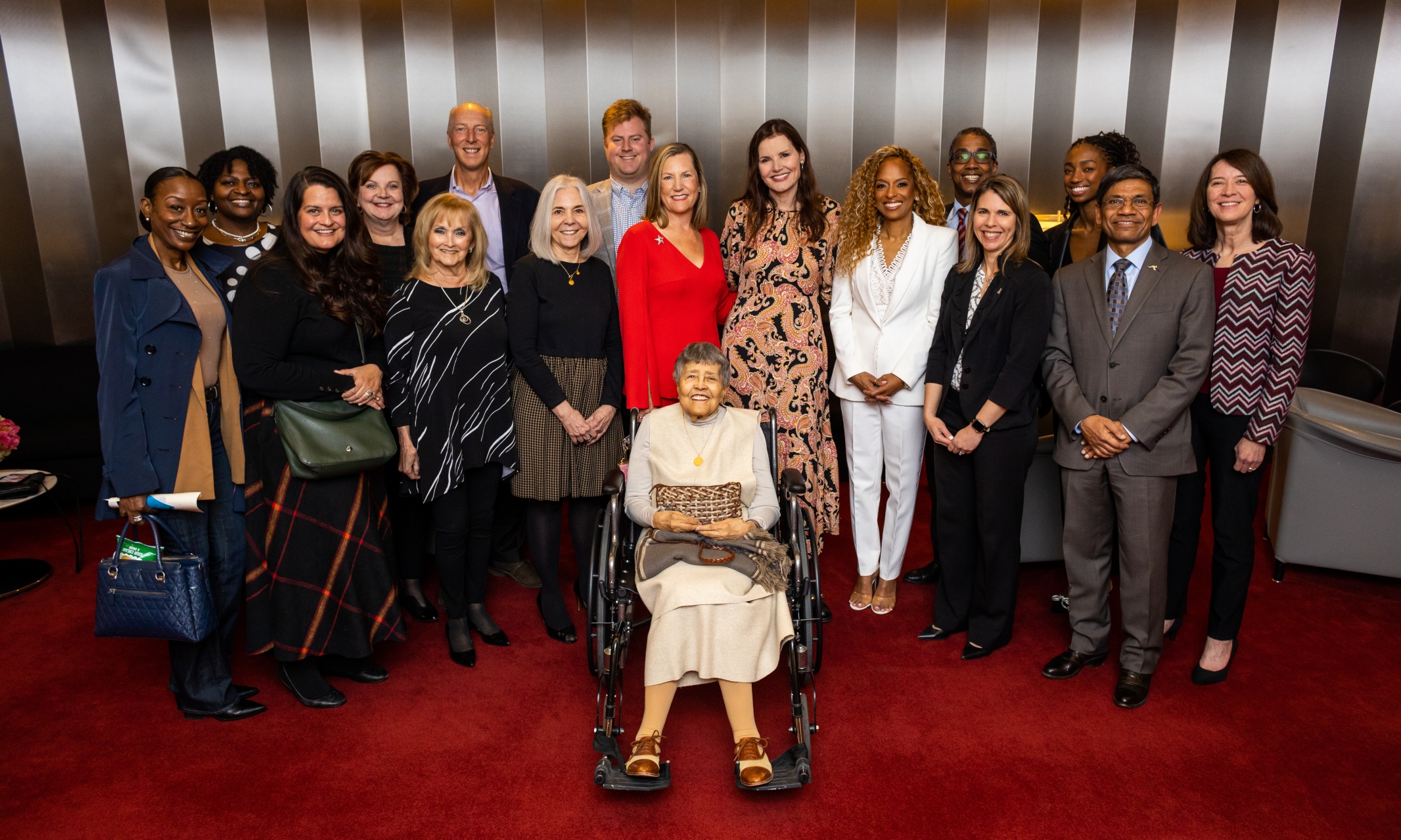
Speaker celebrates the work of women at induction ceremony
The University of Missouri-Kansas City welcomed Geena Davis, actor and founder of the Geena Davis Institute on Gender in Media at this year’s Starr Women’s Hall of Fame event at the Kauffman Center for the Performing Arts. She highlighted the institute’s influence on raising awareness of gender parity in conversation with Madeleine McDonough, moderator and chair of Shook, Hardy and Bacon.
The Starr Women’s Hall of Fame inducted eight women who have been catalysts for positive change in Kansas City and beyond at the event.
Alicia Starr, event co-chair, opened the celebration with Curt Crespino, UMKC vice chancellor of External Relations and Constituent Engagement, and highlighted the significance of the Starr Women’s Hall of Fame archives in honoring outstanding women who have had an influence on Kansas City, and preserving their stories and accomplishments to inspire future generations of women.
Special guest and Kansas City Mayor Quinton Lucas recognized the significance of the inductees’ achievements and the importance of mentorship and recognizing the accomplishments of strong role models, noting that representation matters, and community-based recognition creates opportunities for women of all ages.
Toccara Cash (M.F.A. ’08), award winning actor, voiceover artist and public speaker, noted the importance of highlighting women’s achievements in her introduction of Davis.
“It’s important to tell women’s stories. Women don’t get enough attention for their accomplishments.”
Davis became more aware of gender parity in media when her daughter was 2. Noting the lack of women characters in movies and television, she decided to act. Through research, she realized awareness was the key to change as much gender bias was unconscious.
“We need to take charge of the message,” she said.
Davis noted first steps included making information available. The Geena Davis Institute on Gender in the Media researches and shares data on unconscious gender bias to raise awareness and measure change, noting that media depiction of parity is often worse than reality. She cited statistics that media depicts of men in STEM roles in a 15-1 ratio to women; law is 13-1. She noted that the ratios are better in reality, and that the media is creating a reflection that is worse.
“The United States makes 80% of media worldwide,” she said. “We can influence parity. If it happens on screen, it will happen in real life,” Davis said.
In addition to Davis, previous speakers at the Starr Women’s Hall of Fame events have included First Lady Laura Bush and daughter Barbara Bush, Ashley Judd, “Good Morning America” host Robin Roberts and Chelsea Clinton, daughter of President Bill Clinton and former Secretary of State Hillary Clinton.
2023 Starr Women's Hall of Fame Inductees
The Starr Women's Hall of Fame is held biannually at UMKC, and is dedicated to recognizing extraordinary Kansas City women and preserving the history of their accomplishments. These women are social reformers, volunteers, philanthropists, civic leaders, activists and educators. They are movers and shakers whose tireless commitment to community has made Kansas City a better place to live. This year’s inductees are:
Karen L. Daniel (MS ’81, accounting) is a recognized leader in Kansas City. The first African American woman to be a Major League Baseball owner since her addition to the Kansas City Royals ownership group in 2020, Daniel is retired executive director, CFO and president of Global Finance and Technology Solutions at Black and Veatch. She was the first African American female to chair the Kansas City Chamber of Commerce and has been a leader and advocate for restoration of the Liberty Memorial Tower at the National World War I Museum and Memorial. She has created a legacy fund for scholarships to support Black college students. President Barack Obama named Daniel vice chair of the Advisory Council on Doing Business in Africa in 2015.
Anita B. Gorman has been an advocate for area parks, recreation and conservation for six decades. She fought to save the Native American Hopewell archaeological site, which became a part of the Kansas City Parks system. In 1979, she was the first woman appointed to the Kansas City Parks and Recreation board. In this role she raised funds to establish a conservation center in the urban core of Kansas City. Gorman was the first woman to chair the Missouri Conservation Commission and helped establish the Missouri Conservation Heritage Foundation. She received the Pugsley Medal from the American Academy for Park and Recreation Administration in 2017 for her contribution to the promotion, development and conservation of public parks in the United States.
Lea Hopkins has been an advocate and activist for LGBTQIA communities for more than four decades. She co-founded the Christopher Street Association, a gay and lesbian advocacy organization, in 1977 and organized the first Pride parade in Kansas City in 1979. She founded the Kansas City Gay Injustices Fund, which provided legal support for LGBTQIA people who were arrested based on their orientation. She was a member of the inaugural leadership team of the UMKC Gay Students’ Union. Hopkins is an accomplished poet, watercolor artist and collagist.
Alice Kitchen (MPA ’89) has been a longtime advocate for human rights, healthcare and children and women’s issues. She is co-founder of the Women Quality Coalition and the Child Protection Center. A longtime director of social services at Children’s Mercy Hospital, she was a board member of the Kansas City Housing Authority who helped with neighborhood cleanups and worked to help young mothers obtain health insurance. She was honored by the White House as a Champion of Change for her work on education for the Affordable Care Act in 2015.
Margaret J. May, community activist and a leader for the Ivanhoe Neighborhood Council in Kansas City, Mo., served as the executive director of the Ivanhoe Neighborhood Council from October 2001 to December 2017. During her tenure, the council became a community development corporation that develops new housing and rehabilitates existing homes. The Downtown Council of Kansas City recognized May in their first class of Urban Hero Awards in 2005. She has served on the City of Kansas City Plan Commission and the Kansas City, Missouri Community Development Entity, which is now known as Alt Cap.
U.S Senator Claire McCaskill has dedicated her life to serving women, families and her community. An accomplished attorney, she was the first woman elected as Jackson County, Missouri prosecutor, and the first woman to be elected U.S. Senator from Missouri. In 2004, she defeated incumbent Governor Bob Holden in the Democratic primary, becoming the first candidate to defeat an incumbent Governor in a primary election in state history, although she lost in the general election. She served as a U.S. senator from Missouri from 2007 to 2019. During her term in the Missouri House of Representatives, she chaired the civil and criminal justice committees. She is currently a political analyst for NBC News and MSNBC.
Barbara Pendleton paved the way for Kansas City women interested in careers in finance. She started her career in banking as a messenger with City National Bank. She became chairperson of City Bank at Crown Center and retired as an executive vice president of United Missouri Bancshares, Inc. An active volunteer in community organizations, she was often the first woman member, officer or president. A founding board member of the Central Exchange, she also chaired the UMKC Women’s Center Advisory Committee. She worked for several mayors, including Mayor Kay Barnes, who appointed her to work on downtown Kansas City revitalization.
Freda Mendez Smith (BA ’80) is a champion and advocate for the Latino community in Kansas City. A current advisory board member for the Women’s Foundation of Kansas City, she has worked with MANA de Kansas City for four decades, serving as a board member of the national organization twice. Smith is an advocate and mentor to members of the Latino population who encourages people to become engaged in community service, including serving on local boards of directors. She has been a volunteer board member at many community organizations including the UMKC Hispanic Advisory Board, the UMKC Women’s Council, Greater KC Hispanic Heritage and Mattie Rhodes Center.
How the Starr Women's Hall of Fame archives work at UMKC
Mar 22, 2023
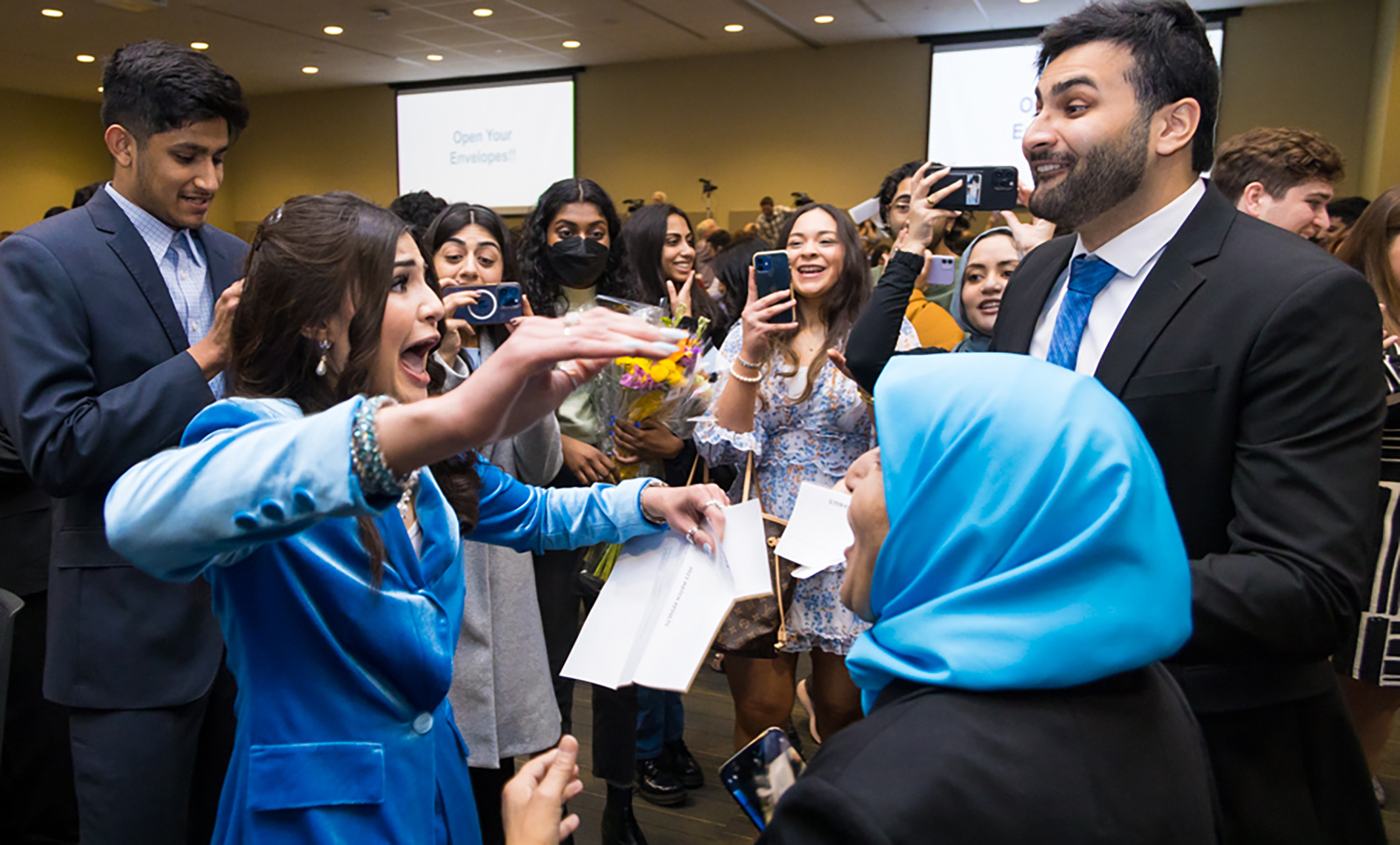
Stories of an untraditional medical student and two siblings who fulfilled their dreams
Tears flowed down his cheeks as UMKC medical student Keith Loftin embraced his wife on Match Day inside the UMKC Student Union, holding a letter in his hands that spelled out the next four years of their lives. His misty-eyed parents looked on as well as he read the news.
Loftin had matched in a residency position at Samaritan Health Services in Corvallis, Oregon, where he will enter his preferred specialty of psychiatry.
“It’s amazing to be here with all these people who have supported me, all the people who care about me,” Loftin said. “It’s all kind of surreal right now.”
Loftin was one of the 112 members of the UMKC School of Medicine class of 2023 that participated this year’s National Resident Matching Program. Like many in the class, he was elated at receiving his first choice of residency positions.
“I found psychiatry and realized how much I connected with it and how much I loved working with my patients and decided this is where I need to be,” Loftin said. “It felt like this is where I belonged.”
His journey to becoming a physician, however, took a different path than the rest of his classmates, most of whom are half his age.
UMKC medical student Keith Loftin celebrated his match in psychiatry with his wife and children.
Prior to moving with his wife and two children to Kansas City and entering medical school, Loftin was a high school science teacher in Jefferson City, Missouri. Before that, he spent nearly seven years in the Army working on Chinook helicopters, then returned to school to earn a master’s degree in education. All the while, Loftin, who earned a bachelor’s degree in nutrition and science at the University of Missouri before joining the Army, said he harbored a hidden desire to become a doctor.
“I was teaching a class for high school students who wanted to enter health care and they kept asking me why I hadn’t gone to medical school,” he said. “After about the 100th conversation my wife and I had about it, she finally said you know what you need to do and that started the ball rolling.”
With the backing of his wife, and while still teaching his high school classes, Loftin began the tedious process of studying for the MCAT exam and preparing to become a full-time student again for the first time in nearly 17 years.
“Medical school was a challenge, but doable,” he said. “I faced a lot of personal challenges.”
During his time as a medical student, Loftin underwent multiple surgeries for back injuries from his time in the Army and helped his wife through the loss of her mother. His efforts paid off on Friday. Loftin applied for residency positions in psychiatry at hospitals across the country from Oregon to Florida, knowing the day would come when he would have to move his wife, a 17-year-old daughter and a 7-year-old son again.
“It’s a little tough,” he said. “It’s not so bad for me. I moved six times to different duty stations when I was in the Army. It’s going to have its challenges, moving my family, but I know my son is excited about it.”
Brother and sister
While Loftin celebrated with his family, Mozammil and Sumaiya Alam were enjoying the day with family and friends as well. The brother and sister from Kansas City, Missouri, had the unique experience of going through Match together.
Mozammil received his desired match in neurology and will be headed to the University of Arizona College of Medicine in Phoenix. Sumaiya matched in internal medicine at Emory University School of Medicine.
“I’m going to Atlanta,” Sumaiya screamed. “ I started crying before I even opened my envelope. This is what I was dreaming.”
Mozammil was sharing a similar excitement.
“There is so much joy right now,” he said. “We both got the matches we wanted.”
While the two were able to lean on each other for support throughout medical school, they were also able to turn for advice about the residency process to their brother, Mobashshir Alam, a 2018 graduate of the UMKC School of Medicine and now a gastroenterology fellow at the University of New Mexico School of Medicine.
“He was really helpful in guiding us through the match process,” Sumaiya said.
Mozammil said having his sister by his side helped as they have gone through the same highs and lows of medical school together.
“We definitely have relied on each other for multiple things,” he said. “During the interview season we were always there to support each other.”
Nearly half of the UMKC students who matched will be entering residency programs in one of the primary care specialties. Internal medicine drew the largest number of students with 19, followed by family medicine with 11 and pediatrics with nine. A growing number of graduates will also be going into psychiatry, which had 11 matches.
Twenty students will remain in Kansas City to do their residencies at UMKC School of Medicine-sponsored programs. Overall, 33 UMKC grads – about a third – will stay in Missouri for their residency programs.
See the full list of UMKC School of Medicine students who matched in programs across the United States from Honolulu, Hawaii, to New York.
School of Medicine Dean Mary Ann Jackson, M.D., congratulated the class, calling Match Day a defining moment in their journeys.
“The lessons you learned here will carry you through your career,” Jackson said.
Mar 17, 2023
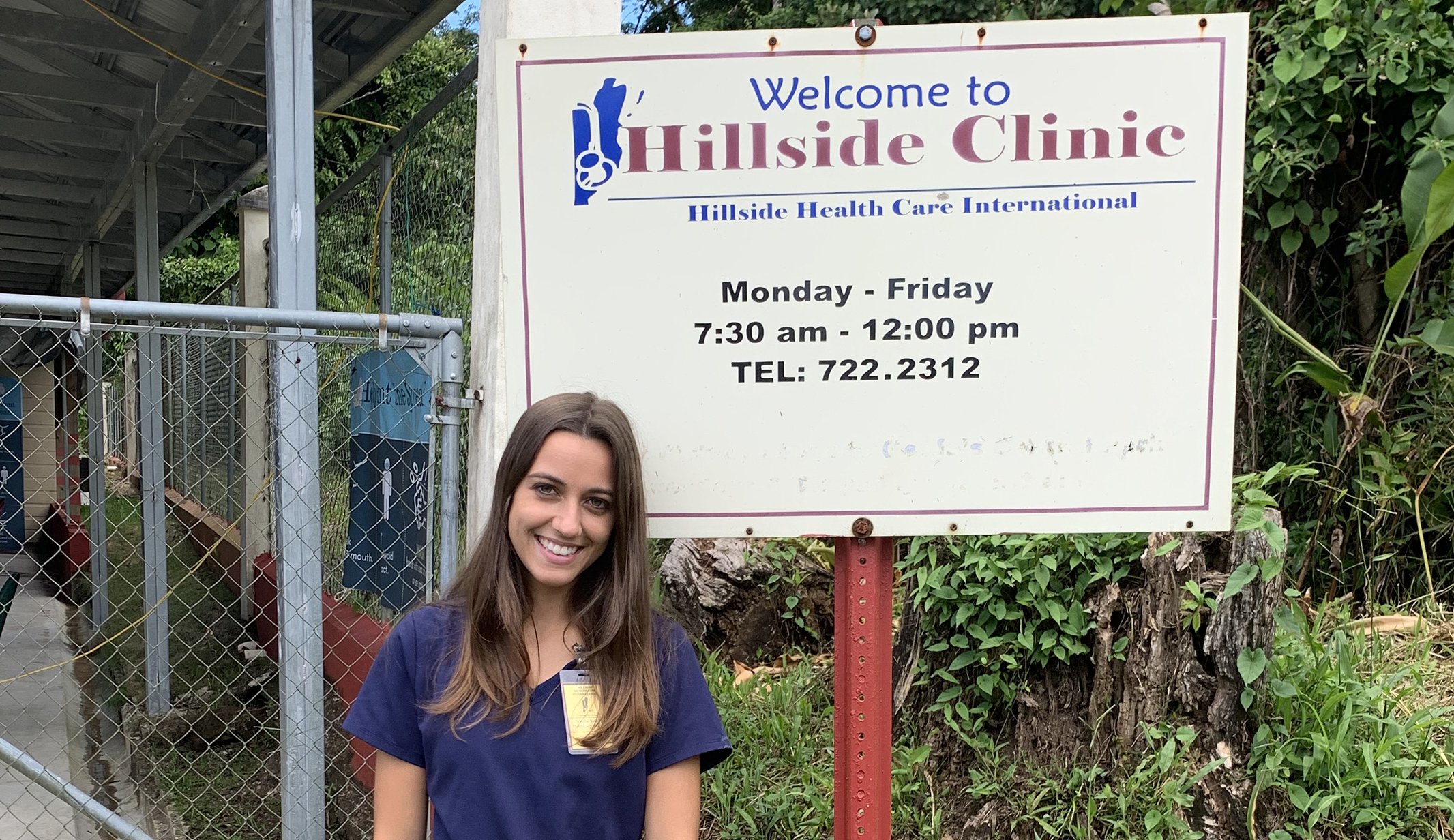
Students from all three of UMKC School of Pharmacy campuses participated in clinical rotations with nonprofit organization
Today’s pharmacists fill a multitude of roles as health care providers, but even this was a new one for UMKC pharmacy student Natalie Bishop.
Bishop is one of three UMKC pharmacy students who spent a month doing a clinical rotation at Hillside Health Care International, a small nonprofit clinic in Eldridgeville, Belize, a tiny community just miles from the port city of Punta Gorda.
During her stint at Hillside, a young boy suffering from acute asthma came to the clinic for a refill on his inhaler. Bishop and the clinic pharmacist explained to the patient how using a spacer, a short plastic tube attached the inhaler, would help deliver the medication to his lungs more effectively and help him better manage his asthma.
Seemingly simple resources, such as a spacer for an inhaler, can be a luxury in this part of the world. The clinic pharmacist and Bishop did the next best thing, cutting up a plastic bottle and strategically applying some duct tape to craft a needed spacer for their patient to use with his inhaler.
Lily Edwards in the pharmacy at Hillside Health Care International.
“They don’t have all the resources down there like we do here, so to be able to think on your feet and use what you do have is important,” Bishop said. “It was so cool seeing the pharmacist make one right there and help the patient moving forward.”
After Bishop, a pharmacy student on the Columbia, Missouri campus, returned home after completing her rotation, Lily Edwards, a student at UMKC’s campus in Springfield, Missouri, took her place in Belize. The two shared similar experiences. The clinic in Eldridgeville is largely made up of volunteers who support a small handful of physicians and one full-time pharmacist. That meant when Bishop and Edwards weren’t working side by side with the staff pharmacist, they found themselves working on their own.
“It really pushed me a lot to know things because resources are limited there,” Edwards said. “I didn’t get to look everything up before I had to answer a question. I really had to know my stuff and be ready to recall it.”
“It really pushed me a lot to know things because resources are limited there.” - Lily Edwards said.
Carlos Olivas, a student on the Kansas City campus, completed the same rotation in January. While Bishop, Edwards and Olivas served the same role at the clinic, collaborating with doctors, medical students and physician assistant students while dispensing medications and counseling patients, Olivas said their situations were different.
“I was actually fortunate enough to have two other pharmacy students there with me,” Olivas said. “We were able to kind of team up together where Natalie and Lily didn’t have other pharmacy students with them to help.”
That came into play on mobile clinic days.
Each week, doctors and students would load a van with essential medications and travel from 45 minutes to three-hours from their home clinic to remote regions and villages where they would see as many as 40 to 50 patients in a day. One long trip took Edwards and her team to a village that had not received medical care for three years.
Operating out of a building with no electricity or running water, Edwards was the lone pharmacist on the team, dispensing medications and counseling patients. Before the day was over, the team had run out of antibiotics before running out of patients. Edwards was forced into problem solving mode.
“Doctors are coming to me saying, ‘I want this antibiotic for an ear infection,’ and I’m telling them, ‘I’m sorry, what’s your next choice? I have this,’” said Edwards, who looked back on the experience as both stressful and extremely rewarding. “It was incredibly eye opening. It definitely pushed me further than I thought was possible.”
Problem solving became part of the regular routine for the student pharmacists as they were often dealing with limited supplies, answering questions about available medications and determining proper dosings.
"I definitely developed a lot of communication skills throughout the time I was there.” - Carlos Olivas
“That was really a neat experience getting to collaborate with (physician assistant and medical students) and show them what a pharmacist can do, the knowledge that we have,” Bishop said. “It was fun to work with them because they didn’t realize what we learn. We don’t diagnose patients, but we have to learn about the diagnosis so that we can recommend the right medications.”
Carlos Olivas working with a patient during a pharmacy rotation in Eldridgeville, Belize.
Those collaborations made for a rewarding experience that Olivas said he wasn’t expecting.
“The discussions were very open,” he said. “They would come to us whenever they needed any kind of expertise in our realm of ‘what is the dosing’ or ‘what do we have?’ Being able to have those open discussions was great and I definitely developed a lot of communication skills throughout the time I was there.”
Not all of their time was spent in the Eldridgeville clinic or the mobile clinics. The three also found themselves enjoying time in another public health service role, visiting local schools and participating in public health fairs, doing everything from blood-pressure checks to diabetes screenings.
Olivas spoke to a group of school children about the need for and benefits of good nutrition and exercise. While interacting with a particular classroom of 30 to 40 third- and fourth-grade students, all smiling and laughing with him, the students at one point began telling him what they knew about carbohydrates and cholesterol.
“I was like, you’re in third or fourth grade and you’re talking to me about that,” Olivas said. “It was really cool.”
Mar 16, 2023
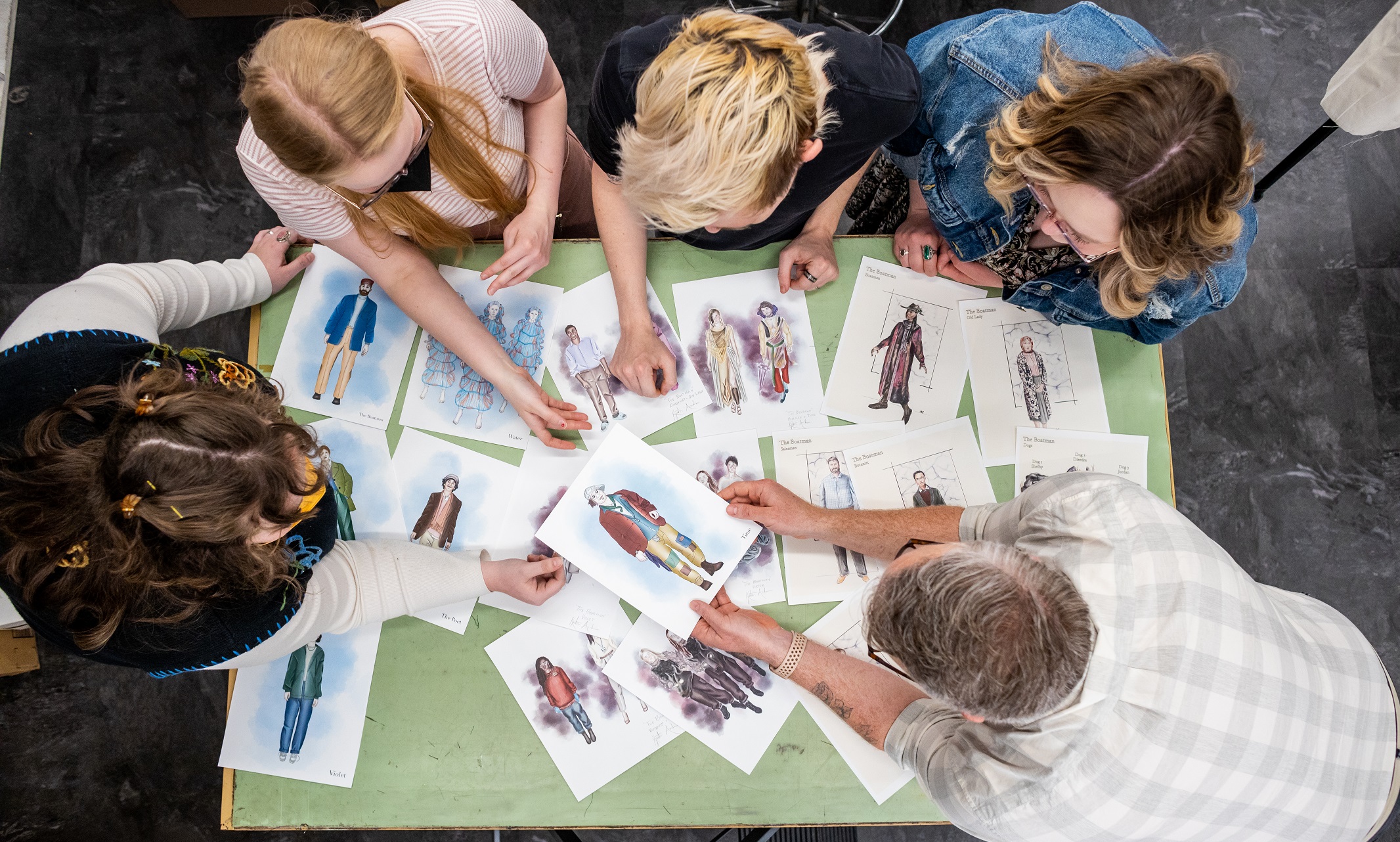
For the sixth year in a row, the program was ranked among Top 10 by The Hollywood Reporter.
The Master of Fine Arts in costume design program is noted in The Hollywood Reporter for its training in both costume design and production, its emphasis on digital graphic skills, entrepreneurial approaches to the field and environmentally conscious practices.
“We are thrilled that our outstanding costume design program is earning this well-deserved recognition,” Courtney Crappell, dean of the Conservatory, said. “When you see UMKC listed with these other top-10 schools, you get a much clearer understanding of the level of excellence and top-value we offer here in Kansas City.”
The Hollywood Reporter also made positive mention of the plan to completely revise the curriculum for Fall 2023. Program head Brandon McWilliams said the changes come from a desire to reflect current trends in live entertainment design.
“We’re making space in our coursework for emerging technologies and digital graphic skills, and we want to help our students develop entrepreneurial toolkits,” McWilliams said. “Our overall focus though remains the same – to prepare practitioners to be successful costume designers, managers and technicians.”
McWilliams arrived at UMKC in August 2022 and has been impressed with the program, particularly its students. An alumnus of another institution on the Top 10 list, Carnegie Mellon School of Drama, McWilliams appreciates the recipe for success at the Conservatory.
“It seems like this place has always offered students an experience so balanced in practical and theoretical approaches that it makes for a really well-prepared and adaptable artist,” McWilliams said. “It’s our students that set us apart, there is such a long-standing trend of success in the profession and in academia from our graduates.”
UMKC was ranked among the University of Southern California, David Geffen School of Drama at Yale and the Fashion Institute of Design and Merchandising.
Here’s the full list.
Mar 15, 2023
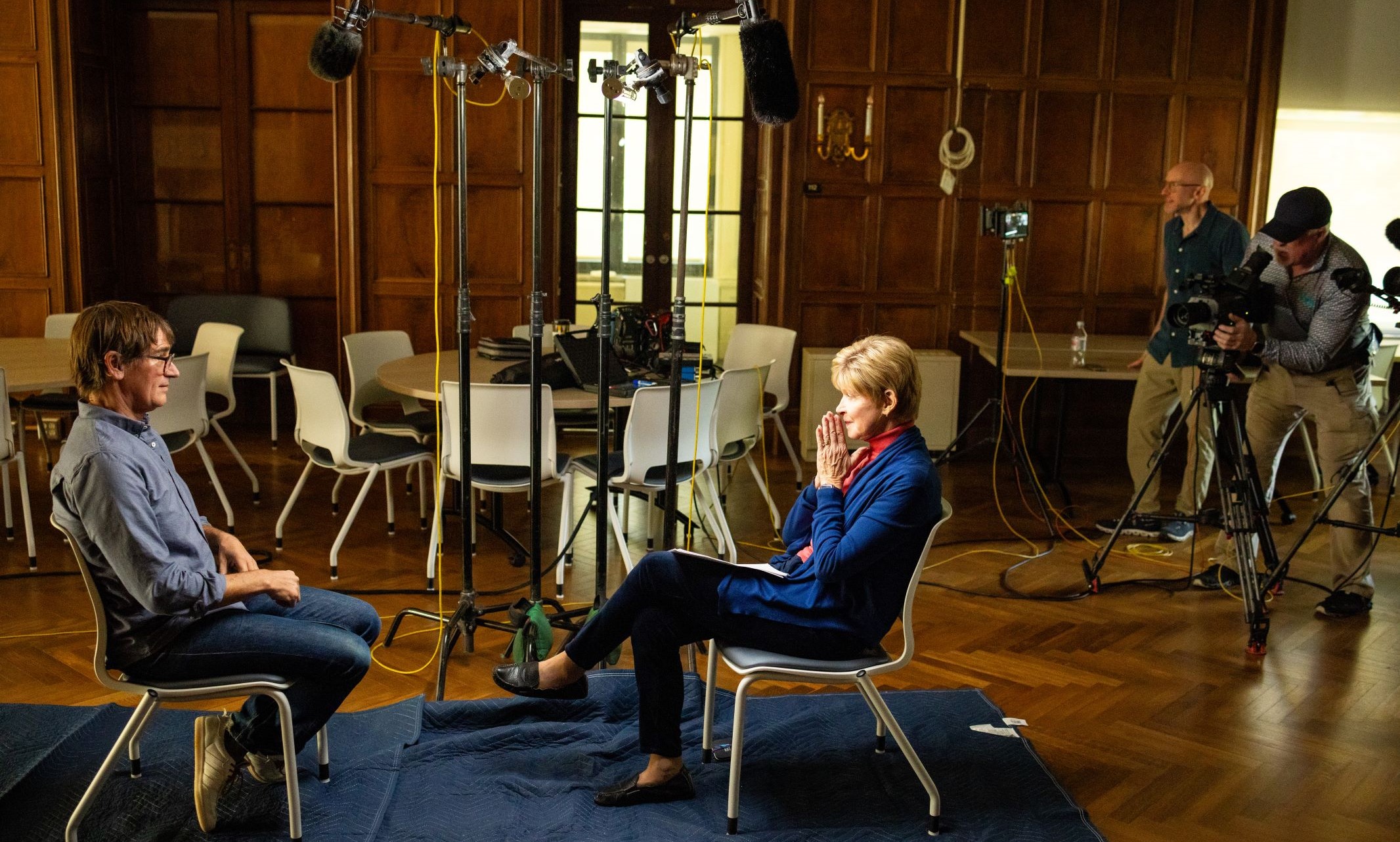
Martin was featured on CBS Sunday Morning, was a Kirkus nonfiction finalist and received the University of Missouri System Thomas Jefferson Award
Clancy Martin, Ph.D, is a well-known professor of philosophy at UMKC. His latest book: “How Not to Kill Yourself” was a 2023 Kirkus Prize nonfiction finalist.
Martin has talked about his personal story about suicide on "CBS Sunday Morning," NPR "Fresh Air" and in the New York Times and appeared at the Kansas City Public Library.
In April 2024, he was awarded the University of Missouri System Thomas Jefferson Award. Martin joins a distinguished group of award recipients who have demonstrated clear excellence and distinction in teaching, research, writing, creative activities and service to the university and humankind.
University of Missouri System President Mun Choi, Professor Clancy Martin, UMKC Chancellor Mauli Agrawal, UMKC Provost and Executive Vice Chancellor Jennifer Lundgren | Photo by Brandon Parigo
We wanted to get to know this popular professor a little better. Here are seven fun facts about Clancy Martin:
Philosophy was not his first major choice.
“I was a chemistry major, and I wanted to go to medical school,” Martin said. But how did he end up teaching philosophy instead of going to medical school? Like many students who end up on a new career path, he took a required elective.
“I didn't even know what philosophy was,” he said. “Then I just had this amazing professor and read a couple of philosophers in that class. I didn't realize that people thought and wrote like this. It made me completely crazy about philosophy.”
He was on the fence about going to graduate school.
When Martin wasn’t sure whether to continue to pursue medical school or a graduate degree in philosophy, he turned to his father.
“Normally, to be frank, he didn't give the best advice and I normally didn't listen,” Martin said. “But I called him and asked him ‘Should I go to medical school or graduate school in philosophy?’ He said ‘Son, all of my friends who are doctors, they complain about how they work all the time and have to deal with insurance. They have no home life. All of my friends who are professors, none of them are rich, but they're all really happy. So, I think you should go to graduate school in philosophy,’ and for once, I listened.”
He used to be in the jewelry business.
After Martin had his first child (bonus fun fact: she is currently getting her Ph.D. at her dad’s alma mater, University of Texas-Austin, but not in philosophy), he dropped out of school for a while. He had brothers in the jewelry business and decided to give working with them a try.
“I thought, maybe I should just make a lot of money rather than be a professor, and I did that for six or seven years,” he said. “I was miserable, and whenever I would get really down, I'd drive to a college campus, just to walk around the campus and see the students. It would make me remember that life was worth living, until eventually I knew I had to get up and go back to graduate school. I had to become a professor because it's just where my heart was.”
He's written for many popular publications, including the New York Times and Elle.
When asked how he started writing for such a large gamut of publications, Martin looked to his heroes, the 19th- and the 20th-century existentialist philosophers.
“Their driving idea is that philosophy should always be relevant to as many people as possible,” he said. “Basically, it should be relevant to the ordinary person on the street. And if we can't reach that person and speak to that person, then we're just not doing philosophy properly. I very strongly believe that.”
His favorite experience with his writing (so far) has been his latest book, “How Not to Kill Yourself.”
He says it’s because it was the hardest to write. It took him about five years.
“It was the most serious self-interrogation that I've done in any of my work,” Martin said. “I think that, as a philosopher, part of your job is to try to go as deeply as you can and ask the questions about the meaning of life. This is when I have done my most thorough attempt yet to investigate that question. It had a life affirming quality to it.”
His favorite part of Kansas City is Midtown.
“I love being able to walk to school,” Martin said. “I love the Nelson-Atkins Museum of Art. I love that Kansas City has everything you want in a big city, but it still feels like a normal size. You never feel overwhelmed, like you can in a lot of big cities. This is just a place that feels right to me. I've had other job offers since I've been here, and I've never been tempted to leave because I love the city, UMKC and our students.”
He wants the student body to know support is available across the UMKC campus.
“If they are having feelings of worthlessness, anxiety, stress or fear, anything like this, reach out, not just to me, but all the faculty and staff at UMKC,” Martin said. “I would like our students to know that we are here for them as human beings and as people to help them in every way that we can. We’re not just an educational resource for them. We're a human resource for them. After they graduate, too. I always tell my students ‘Hey, once you’ve had me as a professor, you're stuck with me for life now. Anytime you need me, send me an email and I'll be there for you.’ And I know that's not just true of me, that's true of all of my colleagues who are faculty at UMKC. This is how we run things at UMKC, and this is one of the best things about our university.”
Mar 13, 2023
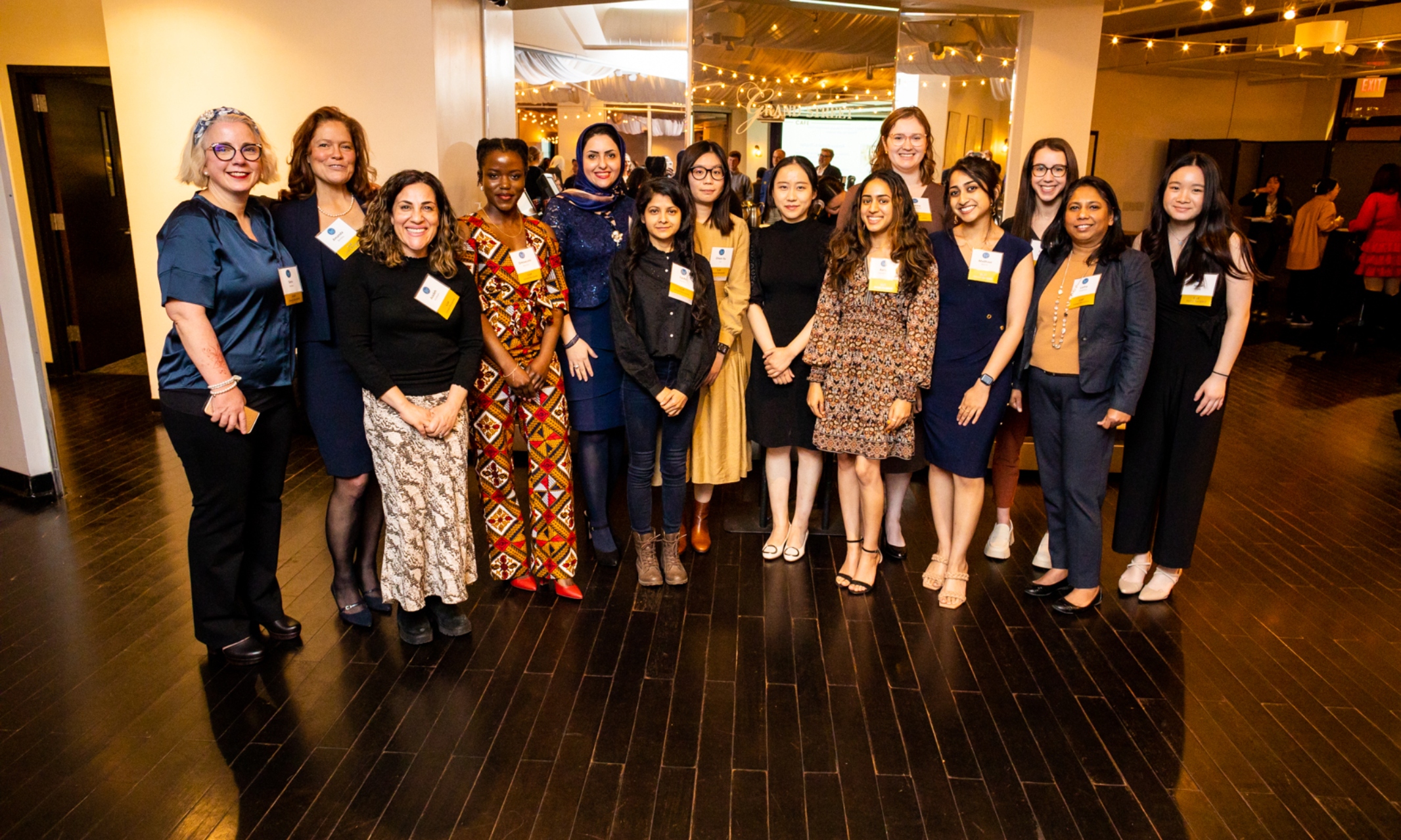
More than $2 million has helped enrich the academic careers of more than 2,000 women
The UMKC Women’s Council celebrated 52 years of supporting women in graduate studies and honoring the 2023 awardees with a reception on March 2.
This year, the group of 77 women received more than $100,000 from the Women’s Council Graduate Assistance Fund. Since its inception, the fund has supported the academic achievements of more than 2,500 women with more than $2.2 million in graduate fellowships.
Ghadah Almousa (Ph.D. ‘24) is researching deep learning solutions to detect and prevent cybercrime in social media. She’s interested in finding solutions to the spread of misinformation and malicious activities. These deep learning models can analyze large volumes of data from social media platforms and identify patterns that are indicative of cybercriminal activity, such as fake accounts, bots and malicious links.
“There is amazing work going on at UMKC. I’m honored to be part of the process.” - Leslie Boe
“Detecting and preventing cybercrime in social media is a challenging task,” Almousa says. “Cybercriminals are constantly evolving their tactics and using new techniques to evade detection. By using deep learning to detect and prevent cybercrime in social media, researchers can help to protect users from scams, fraud and other malicious activities. Also, I have kids, and I want to make the social media environment as safe as possible for them.”
Chancellor Mauli Agrawal with Bibie Chronwall, Ed.D., Ph.D. and Hazel Knutson.
Funding from the UMKC Women’s Council will further her work by allowing her to attend top conferences on cybersecurity and publish her research.
“I am very grateful for the people who provide this funding,” Almousa says.
Rhonda Cooksey, (M.F.A. ’18, GRCT ’18, Ph.D. ‘25 ) is writing her dissertation on representations of racial violence in 19th-century print culture. She received funding to present her research on 19th- century literature and society, and the print culture of the time, and attend a conference that focused on papers that were integral to research.
“The conference call for papers referenced Michael Foucault's concept of parrhesia as a means to interrogate truth--what is it--who tells it--and what are the consequences of telling the truth,” Cooksey says. “As editor of the Colored American Magazine (CAM), Pauline E. Hopkins spoke for agitation at a time when Booker T. Washington stood for accommodation. Hundreds of Black people were lynched every year, and he considered it safer for Black folks to accommodate segregation and not make waves.”
The Women’s Council Graduate Assistance Fund support enabled Cooksey to network with colleagues with similar interests, research archives in the area and further her work on her dissertation. She feels this experience will enhance her career.
Leslie Boe, ( J.D. ’01) is the current UMKC Women’s Council Board of Directors president, and has been on the board for five years. As a shareholder and director at Dysart Taylor McMonigle Brumitt & Wilcox, her work life is demanding. But after attending a Graduate Assistance Fund event, she was inspired by the graduate students and their groundbreaking work.
“I immediately reached out to a board member to let them know I’d love to be involved in supporting the UMKC Women’s Council and its work,” Boe said. “The first year I reviewed applications I was stunned and impressed by the work of our applicants. There is amazing work going on at UMKC. I’m honored to be part of the process.”
Established in 1971, the UMKC Women’s Council Graduate Assistance Fund supports UMKC women working toward post-baccalaureate degrees with up to $2,000 in funds that furthers their completion of graduation requirements and enriches their educational experiences.
Mar 07, 2023
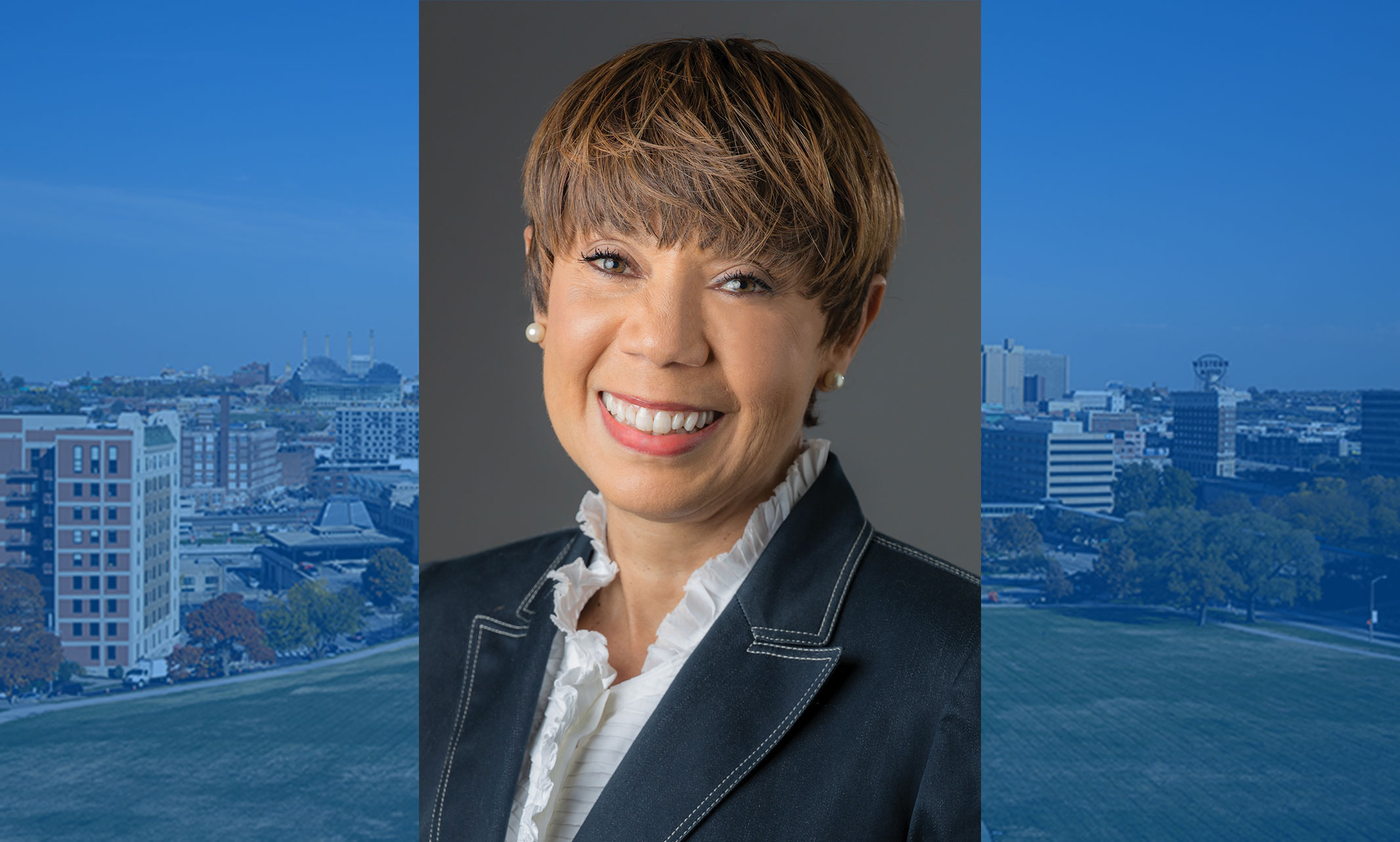
UMKC honors Patricia Macdonald for a lifetime of service
Each year, the UMKC Alumni Association recognizes the achievements of outstanding alumni with an awards celebration. UMKC is honoring Patricia Macdonald with its Class of 2023 Bill French Alumni Service Award.
Patricia (Pat) Macdonald, a UMKC alumna with a Bachelor of Arts in liberal arts and an American Cultures concentration, has always had a passion for urban public education. A product of New York public schools, Pat holds the conviction that “Great minds exist everywhere.” She has taken that conviction into service throughout her professional career.
Macdonald has served as president for the UMKC Alumni Association Governing Board, a UMKC Trustee Board chair, a volunteer for Kansas City Public Schools and Pembroke Hill School, among many other service and leadership positions. She is currently on the boards of KCUR, the Kansas City Ballet, the Missouri Arts Foundation and Visit KC. In all her spare time, she has managed to lead the Strategic Ventures and Operations at the Healthcare Institute for Innovations in Quality at UMKC as a director.
What inspired you to live a life of service?
I can’t say I had a conscious epiphany where I said “I am going to lead a life of service,” but most of us are shaped by what we see, hear and experience on a regular basis. My father never told me to volunteer but he always had messages that equated to “do the right thing,” and he modeled that. He passed away when I was just 9, and fortunately for me, there were a number of women in my life who took special interest in my development and whom, as a result, I quietly admired and I watched very closely. I can say with great gratitude that I am shaped, in part, by them pouring into me, and me, watching them pour into others without talk or fuss but in very special and important ways, when they did not have to.
You are involved in so many organizations – how do you manage your time?
I only consider causes and tasks that I care about, I thoughtfully assess my capacity and I am candid about my capacity before fully accepting a leadership role or new task. The candor is fair to the organization and allows the organization to plan better.
You say that taking opportunities to give back are opportunities to grow in your own personal and professional development; how have you grown?
Opportunities to give back affords me opportunities to interact and develop relationships with people I ordinarily would not, which expands my social and professional aperture. Service has increased my ability to fully analyze situations and conditions which has contributed to my ability to develop win-win and broad-serving solutions. Service has expanded my network of knowledge and professional friends on whom I can call when I need solutions that are not in my personal skillset or personal knowledge base.
What is your favorite UMKC memory?
Having been a UMKC volunteer for as long as I have, I developed tremendous respect and admiration for UMKC faculty and staff. They support volunteers’ efforts at every turn and make sure the volunteer experience is accessible, fun and rewarding. In the fall of 2021, and because of my tremendously rewarding volunteer experiences and esteem for UMKC employees, I was excited to accept a professional position within UMKC. I did not think my respect for UMKC faculty and staff could be any higher but it skyrocketed beyond anything I could have imagined once I began to serve in a professional capacity. I have new insight into what it takes to make UMKC operate with excellence and I bow very low to those who have been serving the university professionally for years.
What is your proudest accomplishment?
My kid! Allister Macdonald. He’s awesome. He’s funny, smart and just graduated with degrees in Kinesiology/Exercise Science and Spanish. He’s also an MMA competitor (I don’t like that part so much, thank goodness he’s good at it).
Where can you be found on the weekends? What are your hobbies?
On weekends, I can be found at the WERQ Dance Fitness studio in the northland having a blast in cardio hip-hop with friends, porch-sitting with my neighbors, reading and/or listening to a book and on Saturdays I am always tuned in to the Session and Soulsations on KCUR 89.3.
About Alumni Awards
Join us in honoring Patricia Macdonald and the other Class of 2023 awardees at an in-person event on the evening of March 10 at Plexpod Westport Commons. For more, visit UMKC's Alumni Association website. If you are unable to attend the event but would like to donate to student scholarships, contributions can be made online.
Mar 03, 2023
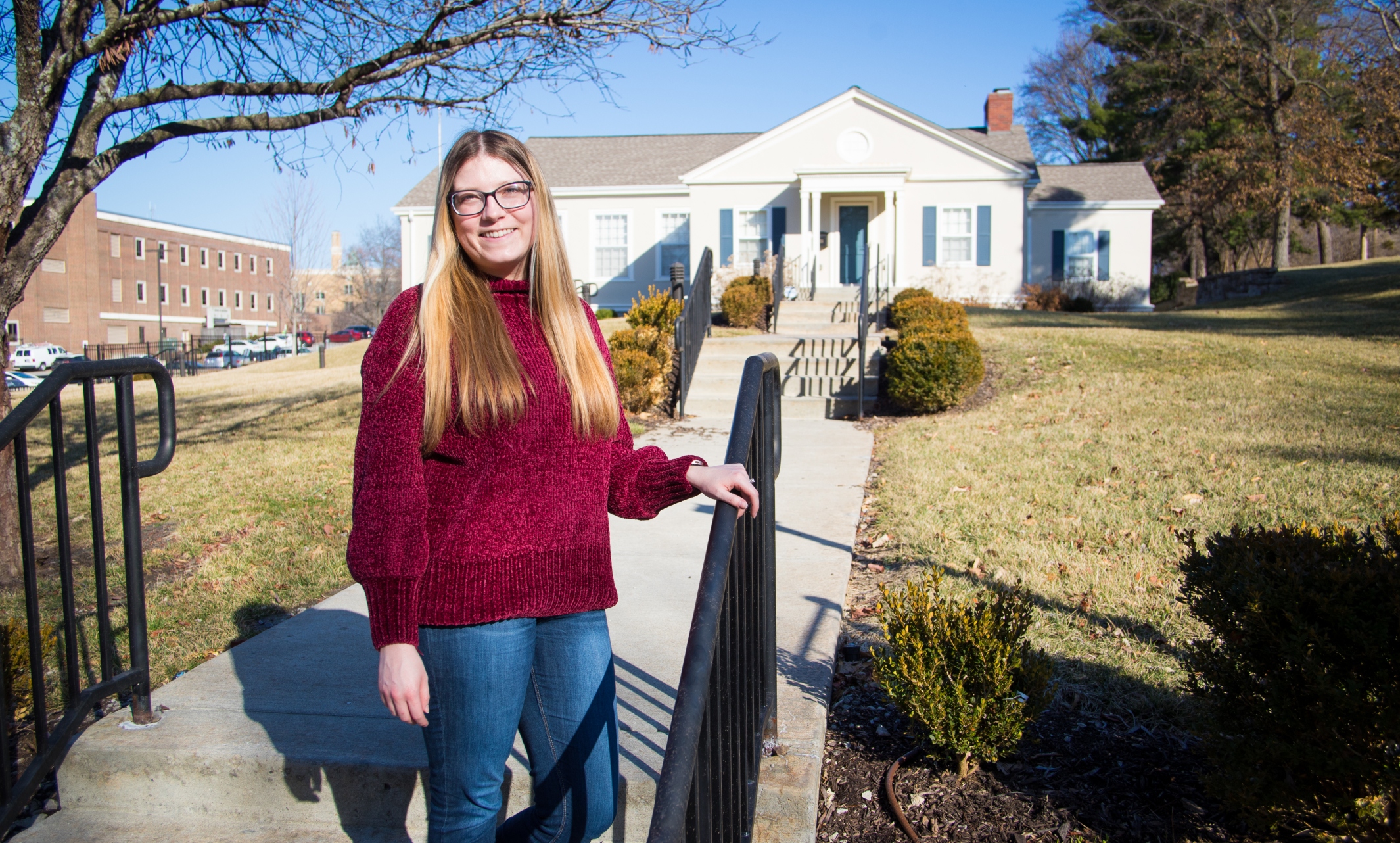
Paid internship provides experience, peace of mind
History student Katy Anielak (M.A.23) had created physical museum exhibits, but her paid internship to develop content for the Clio app led to unique opportunities.
Anielak had participated in undergraduate research, and she wanted to further develop those skills.
“I thought graduate research would be an excellent opportunity to do that while also focusing on topics I’m passionate about,” she says.
Anielak was working with David J. Trowbridge, Ph.D., William T. Kemper Associate Research Professor of Digital and Public Humanities, on content for Clio, a free mobile app that provides guides for history and culture, and he mentioned that the Kansas City Women’s History Trail had not been developed.
“I’m not originally from Kansas City, so the idea of the trail appealed to me to provide assessable information for others, but also to expand my knowledge of the city and the women who have shaped it over time,” she says.
“I don't think I could have found an opportunity that worked around my course schedule as smoothly as this internship, and it helped with my success in both my classes and the internship itself.” - Katy Anielak
Anielak had created physical exhibits before, but this research provided a unique opportunity to create digital content. She worked with UMKC faculty, public history organizations and nonprofits, such as the Midwest Center for Holocaust Education and Operation Breakthrough.
“These interactions allowed me to connect with professionals and broadened my understanding of what goes into both career paths,” she says. “This opened my eyes to the importance of expanding and maintaining public history and nonprofit programs.”
The flexibility of the internship worked well with her class schedule and enabled her to ensure that the quality of the exhibits were well-executed.
“I don't think I could have found an opportunity that worked around my course schedule as smoothly as this internship, and it helped with my success in both my classes and the internship itself.”
This is the scholarship and experience that the Digital Humanities programming was designed to encourage.
“Katy gained confidence and experience as she conducted research that supported her efforts to create virtual museum tours,” Trowbridge says. “We believe that Katy’s virtual tour of the Kansas City Museum will serve as a model and learning experience as we support other historical and cultural organizations in Kansas City.”
Mar 03, 2023
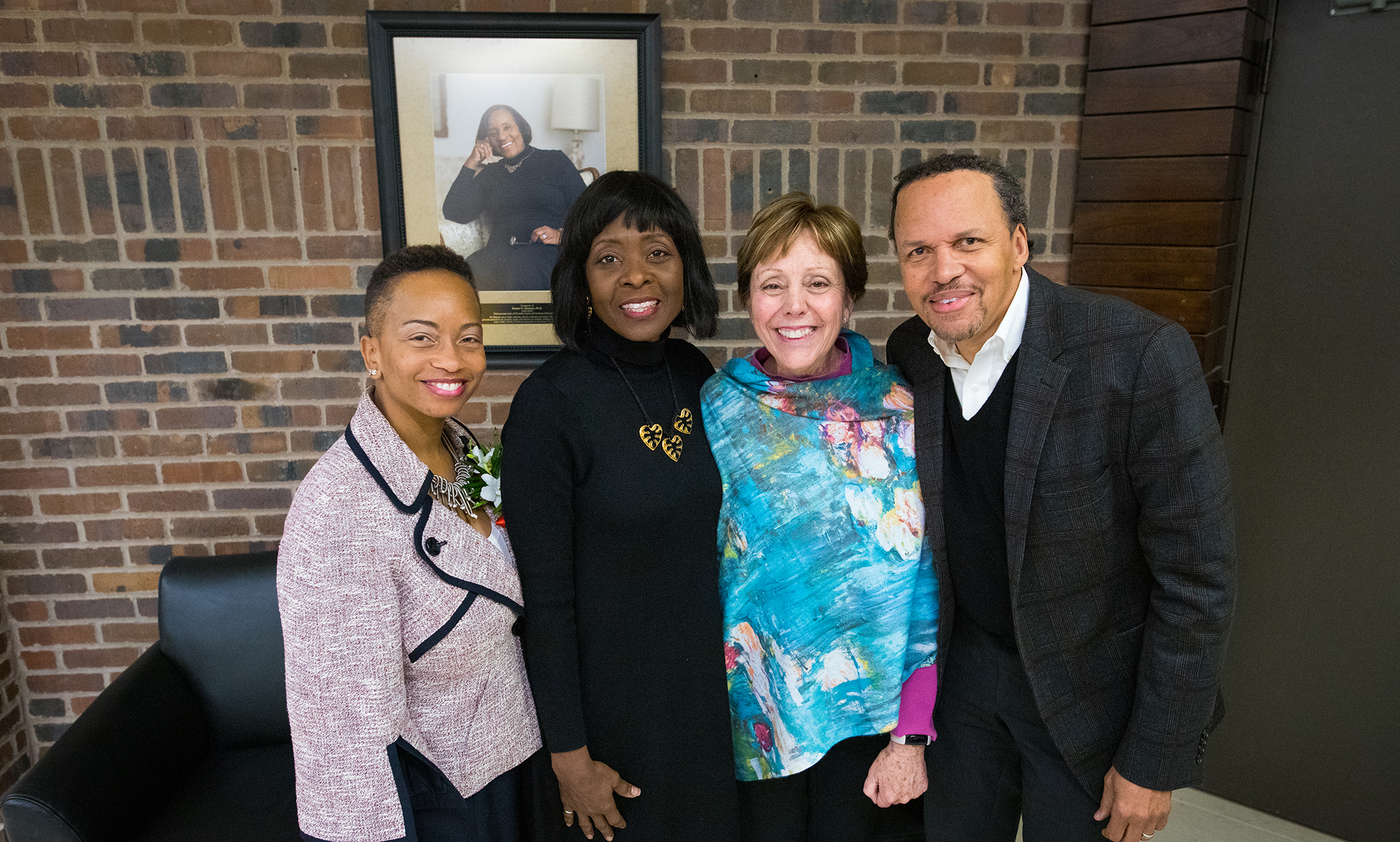
Reaner Shannon served 34 years at UMKC School of Medicine
UMKC celebrated the memory and legacy of Reaner Shannon, long-time director and associate dean of minority affairs at the School of Medicine, with a special tribute on Feb. 24.
Tyler Smith, School of Medicine associate dean for diversity, equity and inclusion; and Shannon’s daughter, Pamela, unveiled a portrait of Shannon, who was a staunch promoter of diversity and equity within the school and throughout Kansas City for 34 years before her retirement in 2008.
The UMKC School of Medicine is renowned for its unique six-year, combined BA/MD program that accepts students directly from high school, and its docent-based mentoring instructional model. Thanks in large part to the efforts of Shannon, it is recognized as a trailblazer in diversity and inclusion as well. Reaner Shannon died last July at the age of 85. Her husband, Henry Shannon, died just five months later, in December, at the age of 89.
The unveiling ceremony took place at the conclusion of the school’s annual Dr. Reaner and Mr. Henry Shannon Lectureship in Minority Health.
The Shannons established their annual lectureship that now takes place each February during Black History Month to create an awareness of health disparities and provide medical professionals, students, residents and the local community information about timely issues that affect underserved and minority communities.
The list of those who have delivered the Shannon Lecture over the years is filled with local, regional and national health leaders. They include leaders such as:
Jocelyn Elders, former U.S. surgeon general (2006)
Gloria Wilder-Brathwaite, founder of Justice Speaks (2008)
Louis Sullivan, former U.S. secretary of health and human services (2015)
Nadine Gracia, deputy assistant secretary of minority health and director of the Office of Minority Health at the U.S. Department of Health and Human Services (2016)
Altha J. Stewart, president of the American Psychiatric Association (2019)
Patrice Harris, past president of the American Medical Association (2021)
Pamela thanked Smith and School of Medicine Dean Mary Anne Jackson, M.D., for recognizing her parents and for the honor of keeping her mother’s legacy alive at the medical school.
“Hospital Hill meant so much to my parents,” she said. “It’s where their careers began and where they ended. This has been like home for us.”
Below the portrait that now hangs on a wall outside the School of Medicine’s theaters is a plaque honoring Shannon as “a leader, educator, scholar, researcher and mentor. She was a tireless advocate and activist for diversity, equity and inclusion for students, residents, fellows, faculty and staff at the UMKC School of Medicine and people in the Kansas City Community.”
Former School of Medicine Dean Betty Drees, M.D., said Reaner and Henry Shannon “were such pioneers in the work that they did and left such a wonderful legacy.”
Reaner Shannon began her career at the school as the main research lab technologist. In 1990, she left the laboratory to become the director of the School of Medicine’s minority affairs office. She became the school’s first associate dean for minority affairs in 1998, a post she held until she retired.
Smith served as the keynote speaker for this year’s lectureship, addressing the importance of mentorship, coaching and sponsorship of “underserved-in-medicine health professionals.” She spoke about how Shannon was a champion of supporting and advocating for students.
“Every medical school needs to have a person like a Dr. Shannon,” Smith said. “One of the joys she had was to serve as a mentor to students interested in science and in medicine.”
Mar 01, 2023
